Over-penetration in a home defense situation can cause more harm than the original threat.
If, God forbid, someone should break into your home, you will have a million thoughts racing through your head, and a stress level some people may never feel in their life.
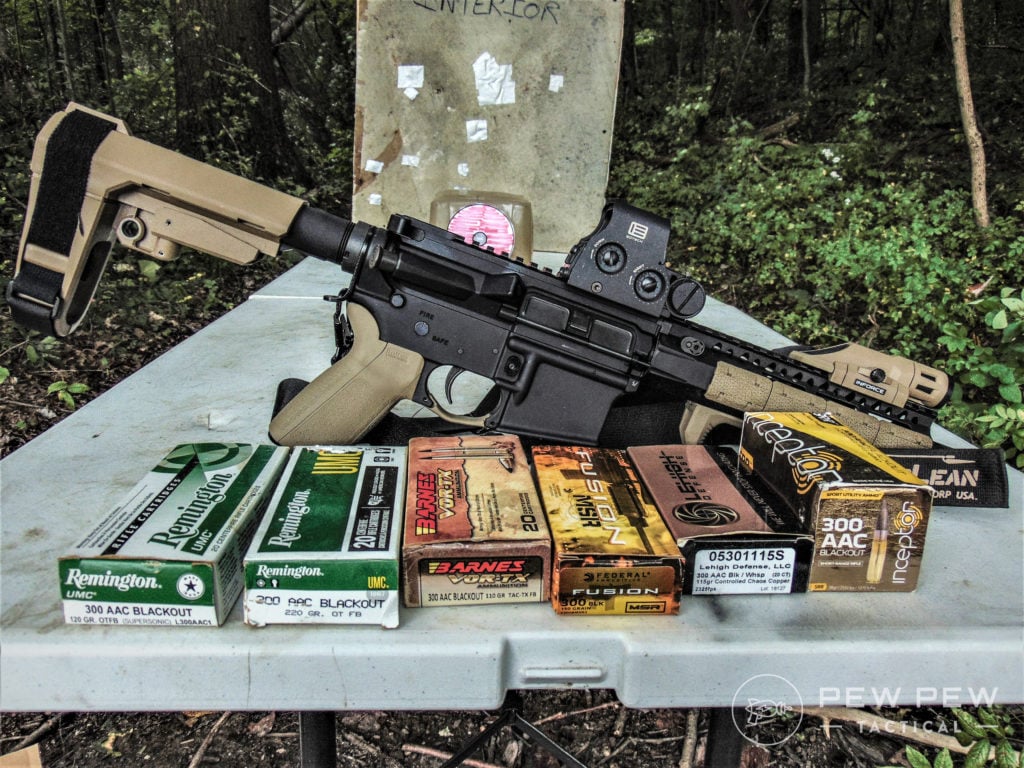
While you are nice and safe reading this article, this is EXACTLY the time to think about over-penetration and the liability that comes with it.
In this article, I will be discussing over-penetration with 12-gauge shotgun loads, 9mm and .45 ACP handguns, and finally 5.56 NATO/.223, and .300 BLK AR-15s.
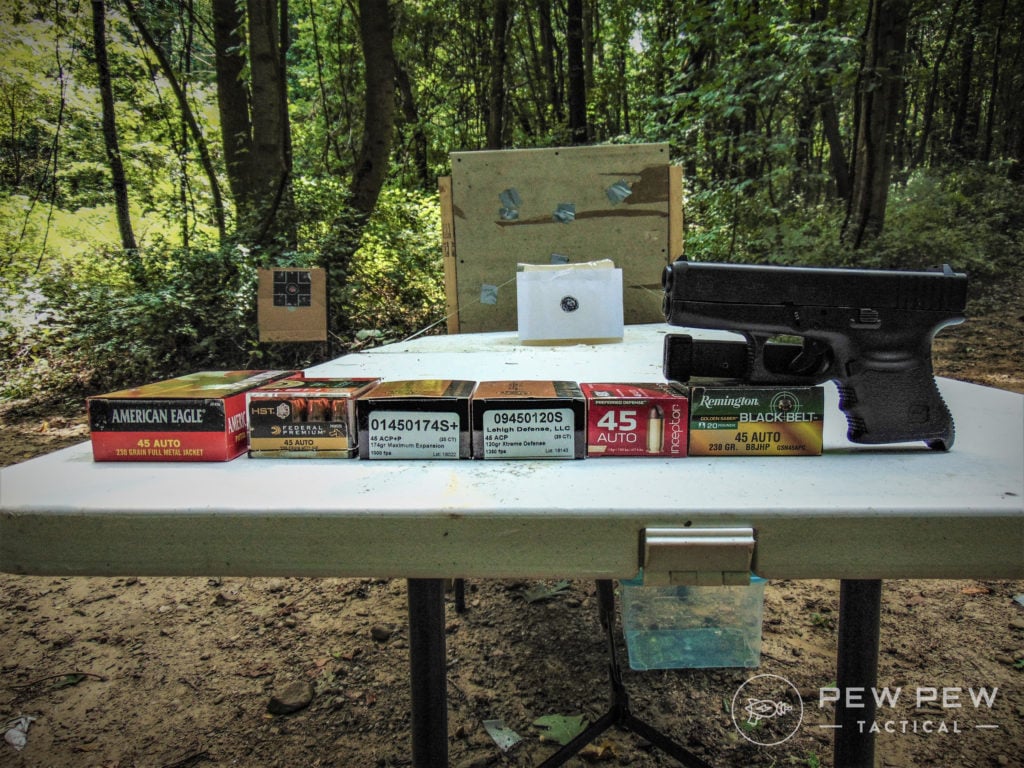
This is not a test of the firearms, but rather a test of what the firearms are shooting.
Assuming you are looking at roughly the same barrel lengths, the exact firearm using these cartridges will be approximately the same.
Penetration testing was done these loads through real, current building materials, and I will cover the pros and cons of each caliber/load and how they performed in testing.

This is a long article, but it’s important and worth the full read.
We’re going to dispel some fudd lore and provide real data to help you make the best decision for your family in your home.
Table of Contents
Loading…
The Setup
To simulate a real home, I made 2’x2’ frames with 2″x4″ studs and then sheeted them with 3/8″ drywall on each side to simulate an interior wall.
I also built a simulated exterior wall by framing a 2’x4′ wall sheeted in 3/8″ drywall and 1/2″ plywood on the exterior side. Inside of the exterior wall, R13 insulation was added for added realism.
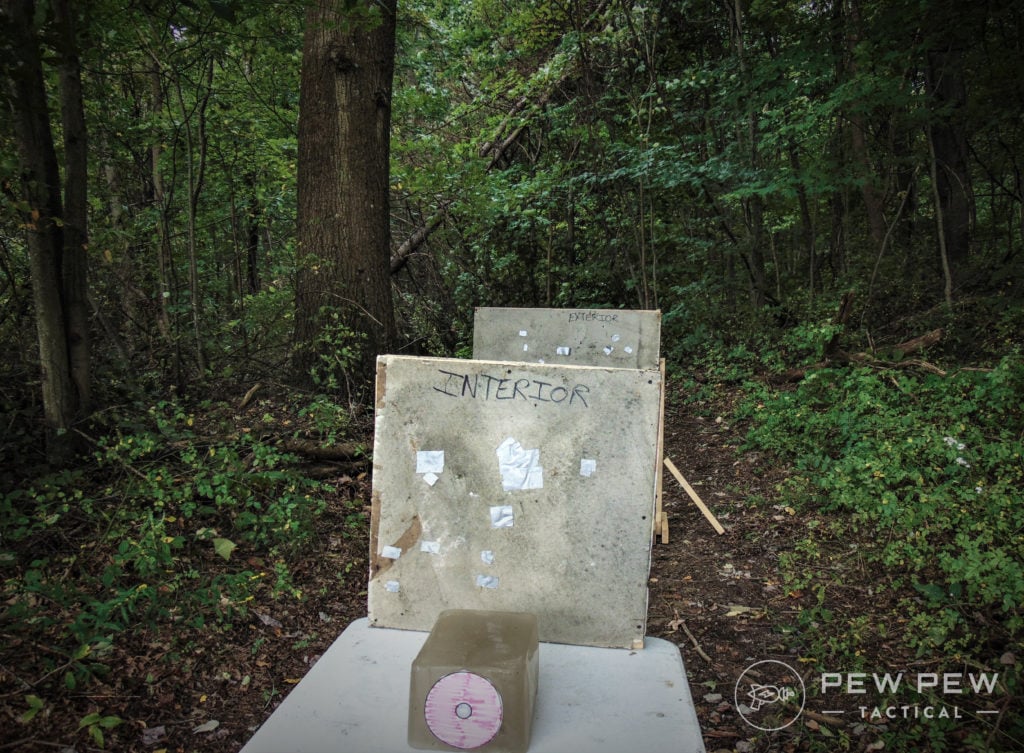
A card table was placed with a 12″ long 10% ballistic gel block 12 inches in front of the interior wall panel.
This 12″ of ballistic gel is used to simulate an intruder’s chest cavity. The gel was calibrated per FBI specs for 10% ballistic gel and can be found at Clear Ballistics.
Ten feet behind the interior wall, the exterior wall was placed. All shots were taken 10 feet away from the 12″ ballistic gel “torso”.
If a round made it through the gel and both walls, it failed the test for over-penetration. A “clean miss” was also shot with every load to test over-penetration when the shot did not encounter the ballistic gel block.
Here’s a hint. Don’t miss.
Soft tissue does a heck of a great job with slowing down projectiles and destabilizing them for potential fracturing. Every load with exception of the #9 Birdshot, blew through both walls and “exited the house” when there was a clean miss.
Disclaimer
I understand that all homes are different, so before people start chiming in what their home is made of, I think my choices show current common materials that are used in the manner they are most often employed.
You may have brick, cinderblock, plaster and lathe, or have open floor plans in your Scrooge McDuck mansion. My setup would be more typical for smaller single-family homes.

It should also be pointed out that ballistic gel does not represent a human well, it has no bone, fat layer, clothing, or muscle.
All of these are somewhat different for each person, and exact shot placement will also matter, so real-world results will have a degree of variation to them that we cannot replicate.
The point of the gel is to give a consistent medium that is dense enough yet soft enough to effectively test munitions. The primary goal is standardization, not perfect replication.

Results will also have slight differences depending on the firearm you use. But it shouldn’t be hugely different. The design and overall specs of a cartridge are more important.
Lastly, please actually read to the end of the article before you start writing your dissertation on why you think I’m wrong.
And remember that I actually tested all of this, have you?
EDITOR’S NOTE: Please forgive the parts where Ken reiterates himself, we wanted to make sure that if you the reader only jump to one section to read the results, you would have the critical information needed. As such, we describe in short the set-up and testing multiple times.
With that out of the way, time for the fun stuff!
Shotgun Over-Penetration Testing
The Shotgun And The Shells
The shotgun that I had for testing was supplied by Remington Arms. It is their 870 DM Predator with an 18″ barrel in a Highlander Kryptek finish. It has a thumbhole stock and utilizes a 3 round or 6 round detachable magazines.
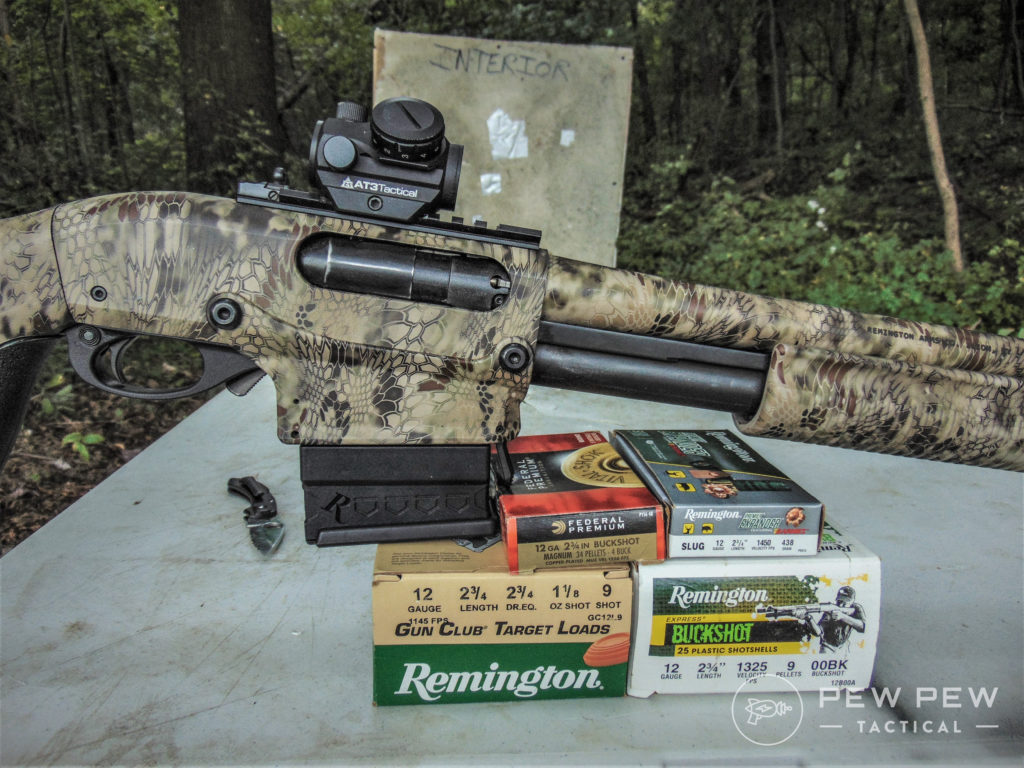
Cycling has been reliable, and I have really enjoyed the shotgun while hunting, or running defensive drills with it. It also has proven itself to me from multiple hunts with hogs, turkeys, and coyotes.
Prices accurate at time of writing
Prices accurate at time of writing
-
25% off all OAKLEY products - OAKLEY25
Copied! Visit Merchant
Not one hiccup, so for me, it has been my choice for home-defense.
Mounted on top is an AT3 Tactical RD50 micro red dot sight. Zero has always stayed locked on, and the mini red dot has performed flawlessly. I tested 4 different loads ranging from the whole spectrum of shotshells.
Shotgun Results
| 12GA 2-3/4″ Shells | 12” Ballistic Gel | Interior Wall | Exterior Wall |
|---|---|---|---|
| Remington #9 Target Loads | Stopped In Gel | N/A | N/A |
| Remington 00 Buck | Pass Through | Pass Through | Pass Through |
| Barnes Expander Slugs | Pass Through | Pass Through | Pass Through |
| Federal Premium #4 Buck | Pass Through/Stopped In Gel | Stopped in Wall | N/A |
Remington 2 3/4″ #9 Target Loads – PASS… KIND OF
I wanted to test birdshot first to clear up some possible misconceptions. A lot of people who worry about over-penetration consider low brass, birdshot loads to be a perfect choice for home defense. This is a bit of a gray area in my opinion.
Lethality has been proven to be less than desirable and fluctuate depending on the range to the target.
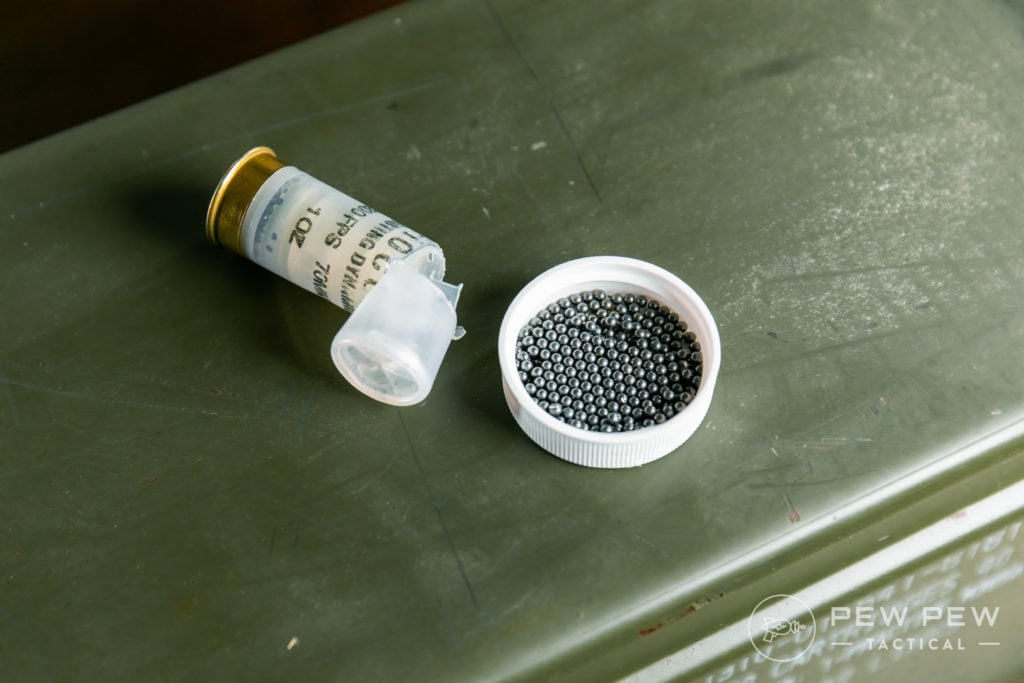
While I don’t think you will ever meet someone that would want to be hit by birdshot within 20 feet, lethality is an important topic.
If someone is actively trying to take your life, a load needs to have adequate penetration to reach vital organs.
While this load did not over-penetrate after it hit 12″ of ballistic gel, on a real human target with fat, dense muscle tissue, and a rib cage, it may not get the job done due to small shot size and shot deformation.
Prices accurate at time of writing
Prices accurate at time of writing
-
25% off all OAKLEY products - OAKLEY25
Copied! Visit Merchant
I give these loads a passing grade, but only as a LAST OPTION.
There are MUCH better loads for lethality.
Remington 2 3/4″ 00 Buck – FAIL
00 Buck has always been a popular option, but the problem is that most people do not consider over-penetration. While it has devastating terminal ballistics, the dense and fast-flying .33 caliber pellets do not stop after encountering soft tissue.
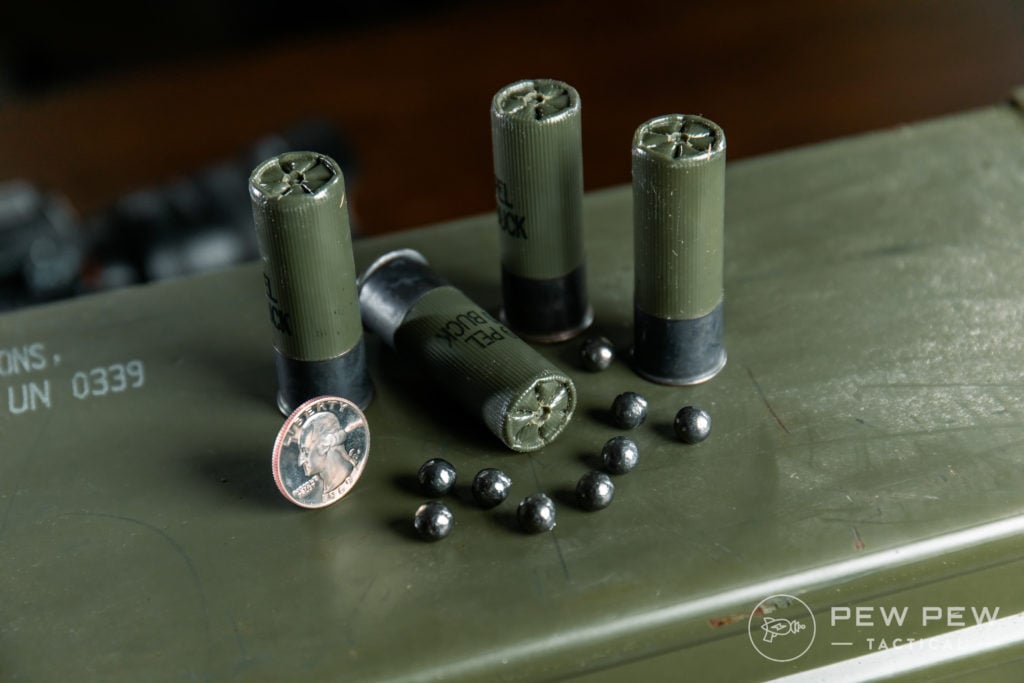
Testing these loads proved that after encountering 12″ of 10% ballistic gel, the pellets continued through the first interior wall and easily passed through the exterior wall.
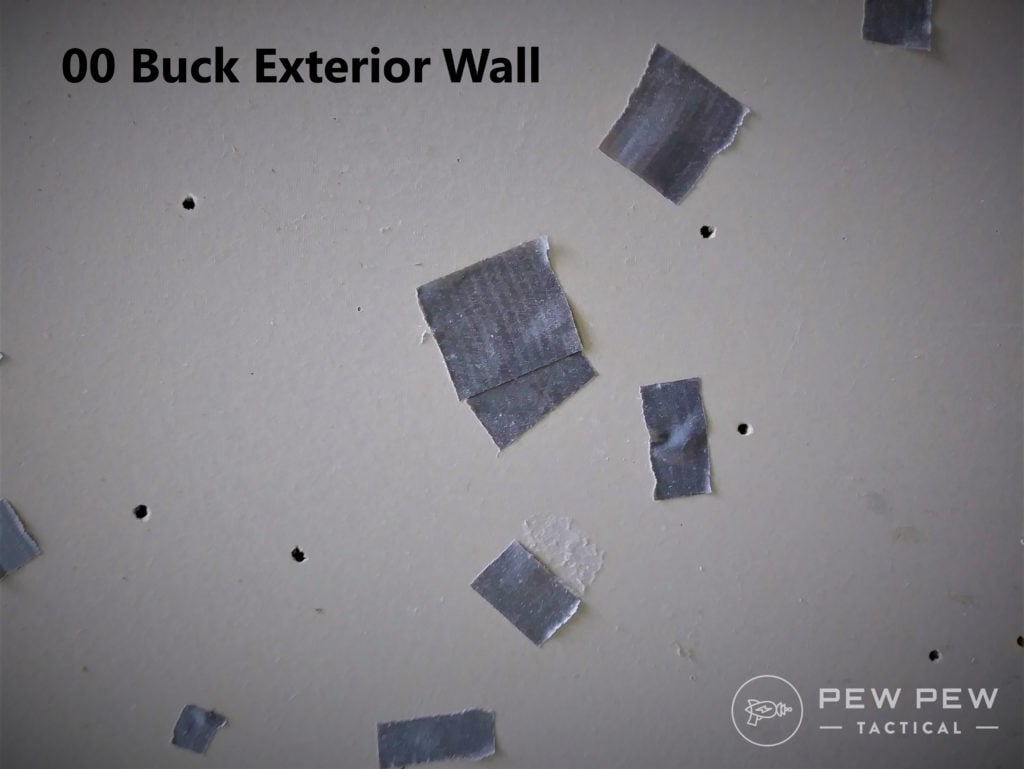
Since this test deals specifically with over-penetration, 00 Buck gets a failing grade for home defense.
Prices accurate at time of writing
Prices accurate at time of writing
-
25% off all OAKLEY products - OAKLEY25
Copied! Visit Merchant
Terminal ballistics would be devastating, but like a freight train, they weren’t deterred by flimsy drywall or 1/2″ thick plywood panels after exiting.
Barnes 2 3/4″ Expander Slug – FAIL
Loading the Barnes Expander slugs into the 870 DM’s magazine I hoped for the best.
I thought that there could possibly be a chance that due to their design, the slug would have enough rapid expansion that they could slow enough to not punch through both interior and exterior walls.
All hopes were shattered after my first shot. Once again, the slug pile-drive through a fresh 12″ of 10% ballistic gel without a hiccup and sliced through each wall with little effort.
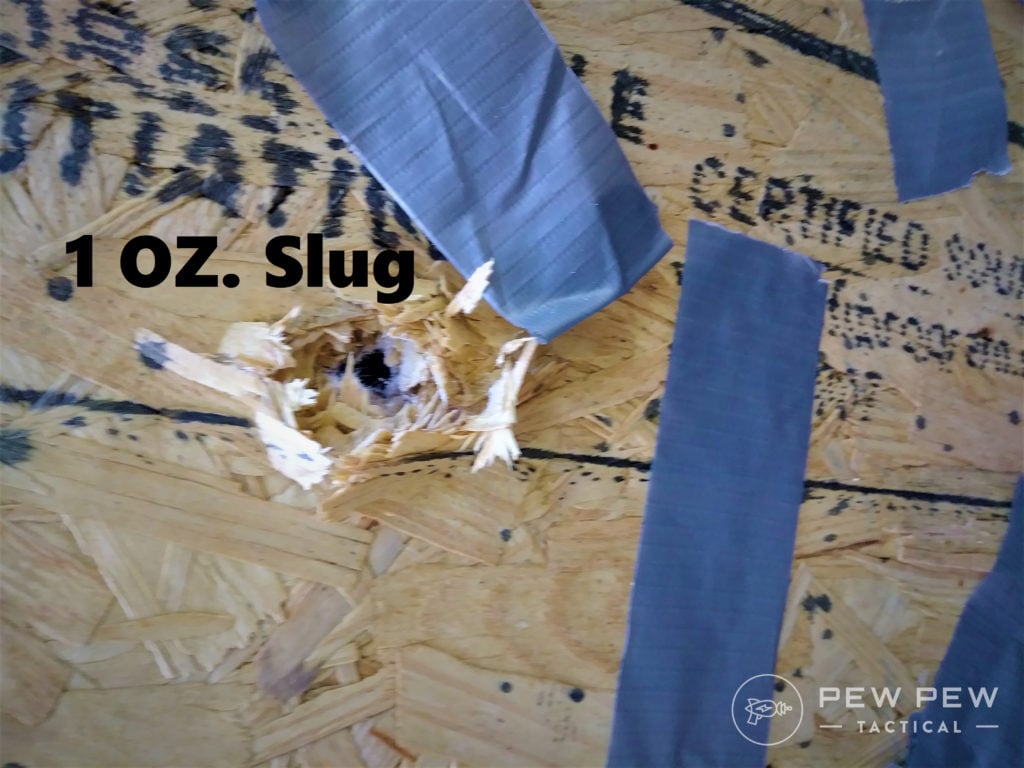
The velocity and the mass of the slugs create a deadly mix of incredibly high muzzle energy, which translates into serious over-penetration through barriers.
Prices accurate at time of writing
Prices accurate at time of writing
-
25% off all OAKLEY products - OAKLEY25
Copied! Visit Merchant
I wouldn’t think twice about using this slug in a hunting scenario but for a home defense load, almost any slug will likely leave your home and fail.
Federal Premium 2 3/4″#4 Buck – PASS
After witnessing the last loads fail the test, I didn’t have much hope anymore that a shotgun load in 12 gauge could meet requirements of deadly lethality, and not blow through multiple walls and exit a simulated home.
Hope soon returned to me though after firing Federal Premium’s #4 Buck out of the Remington 870 DM Predator.
This load is loved by many coyote hunters because the pattern and range work well, and the size of the pellets perform well on soft tissue.
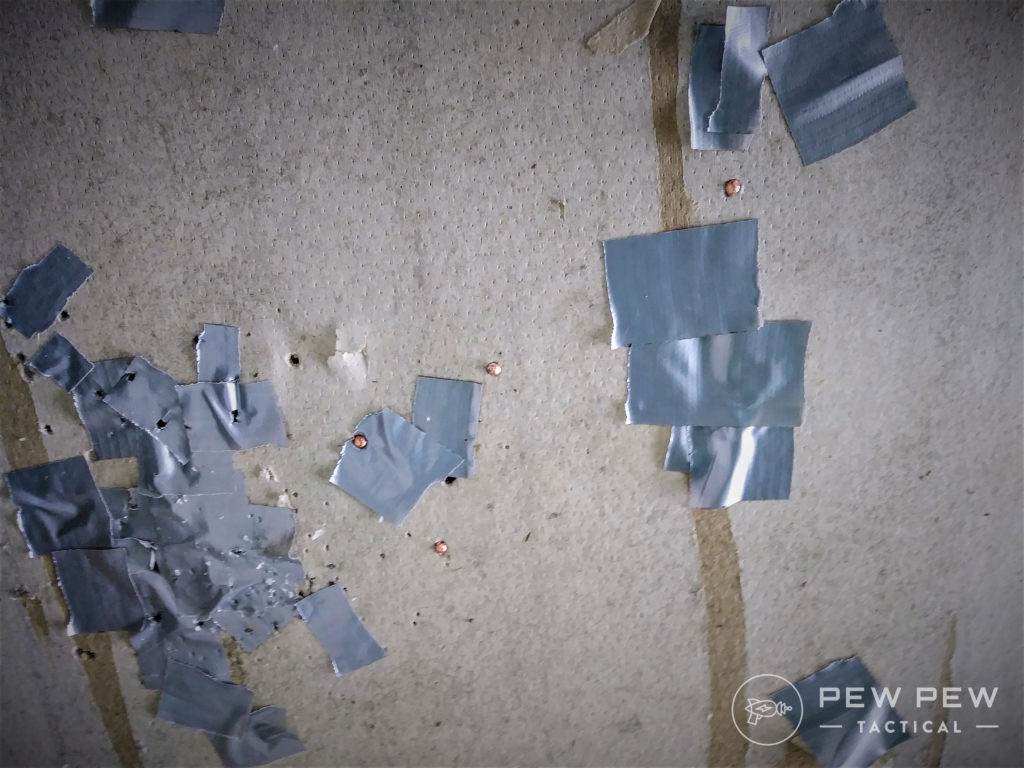
With most of the 29 pellets either lodging themselves within the 12” gel block or being stuck within the interior wall, this type of load is in the “goldilocks zone” of terminal ballistics and lacks severe over-penetration like 00-Buck.
Firing into the 12″ ballistic block, it was apparent that not all the .24 caliber pellets passed through the first wall. Upon visual inspection, some of the pellets stayed within the 12″ of gel, while some were planted into the first sheet of drywall.
Prices accurate at time of writing
Prices accurate at time of writing
-
25% off all OAKLEY products - OAKLEY25
Copied! Visit Merchant
A few pellets were stuck within the first interior wall. Out of all the loads tested, this load proved to be the leader of the pack.
Best 12 Gauge Home Defense Loads
Based on this testing, only one shotgun load is really good enough to recommend, but shotgun loads are more acceptable as a class than other ammo types – so here is a couple of options for #4 Buck you might want to look at.
1. Federal Premium 2 3/4″ #4 Buck
As our testing shows, Federal Premium #4 buck is a solid choice that delivers on every front in a shotgun load. We trust it.
Prices accurate at time of writing
Prices accurate at time of writing
-
25% off all OAKLEY products - OAKLEY25
Copied! Visit Merchant
2. Federal Power Shok 2 3/4″ #4 Buck
Power Shok has been around a long time and is a common load for deer, hog, and more. If it works on 4-legs, it works on 2. It is a bit more velocity than the Federal Premium, so if you have thin walls keep this in mind.
Prices accurate at time of writing
Prices accurate at time of writing
-
25% off all OAKLEY products - OAKLEY25
Copied! Visit Merchant
3. Sellier & Bellot 2 3/4″ #4 Buck
Sellier & Bellot is one of our favorite brands for ammo, in every caliber and cartridge we’ve tried it in we’ve always been pleased with the reliability and stability of their ammo. If you have a semi-auto shotgun that is picky on ammo, give S&B a try.
Prices accurate at time of writing
Prices accurate at time of writing
-
25% off all OAKLEY products - OAKLEY25
Copied! Visit Merchant
Pros and Cons for The Shotgun
The 12-gauge shotgun is a proven weapon that has been fielded by the military, law enforcement, and millions of Americans out in the field while hunting.
It is a formidable weapon that has impeccable power within short to moderate range, depending on the load being used.
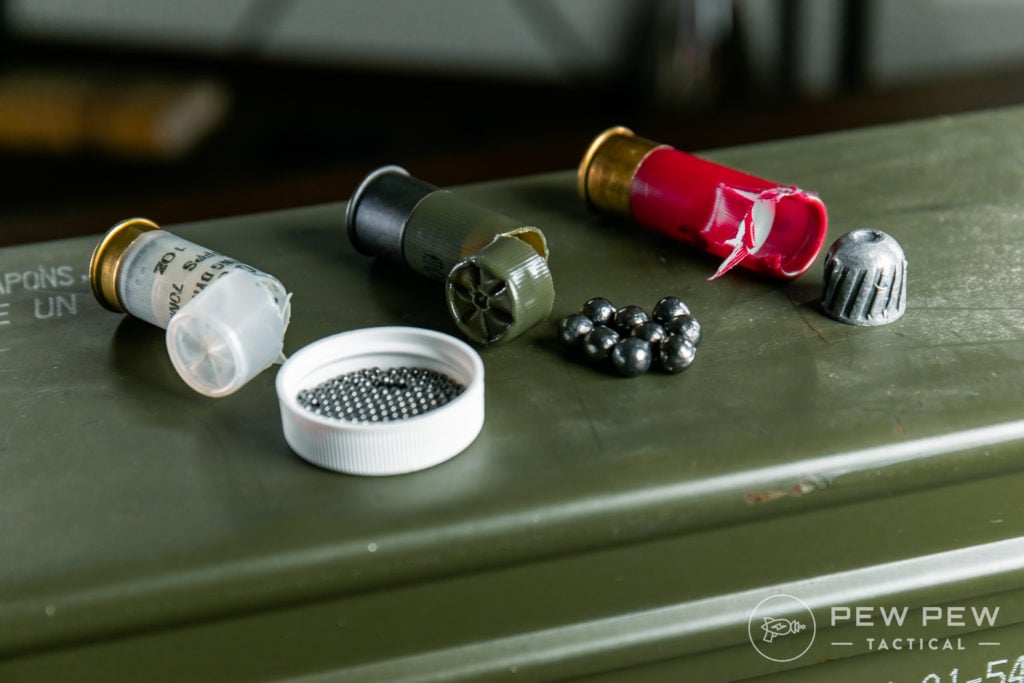
Multiple loads are one of the biggest advantages to the shotgun since a shooter can have a very diverse choice between birdshot, buckshot, slugs, and honestly even less-than-lethal offerings with bean bag or rubber shot loads.
The shotgun is highly adaptive, and there is no wonder why some people would choose it for self-defense in the home.

It would seem odd to consider power being a detriment to home defense with a firearm, but a 12-gauge shotgun must be wielded responsibly.
A higher level of recoil should be considered as well as over-penetration. #4 Buckshot is really the only load that I would recommend in a home defense situation.
When you also consider magazine capacity, and the substantial recoil of the 12-gauge compared to a carbine or short-barreled AR15, the cons add up quickly.
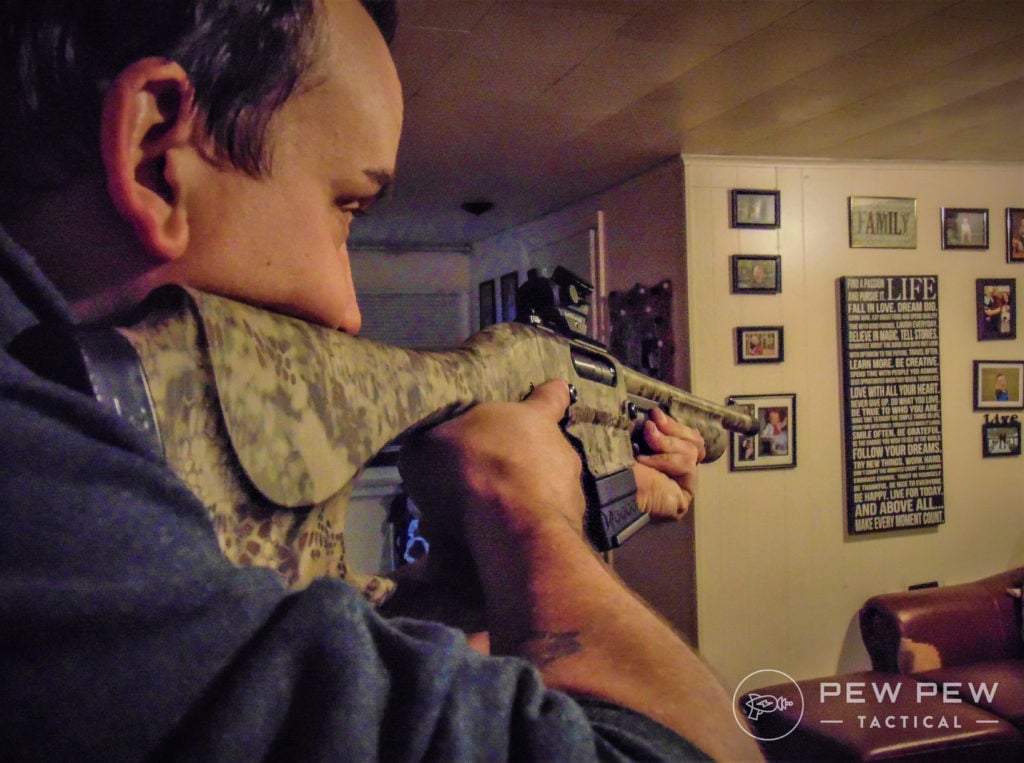
With any weapon, train with it to minimize any user error issues that are common with the pump shotgun like short-stroking.
With regards to over-penetration though, the more lethal loads must be used responsibly, and you need to know your home. Keep in mind, 10% ballistic gel is still not a human being.
This is the most scientific way to replicate a home intruder shooting, and YMMV.
Final Shotgun Grade
Terminal Ballistics – 5/5
Depending on the load, the shotgun is an absolute powerhouse when it comes to terminal ballistics, shock, and awe. But keep in mind, you need to use the proper ammunition if over-penetration is a concern with you.
Wound Channels – 4/5
A slug is a game-ender, but when it comes to better loads for home defense the #4 Buck is still a solid performer.
#9 Birdshot, if it is the only thing available, is not a horrible option in terms of over-penetration, but it must be understood that it will not be effective on soft tissue unless the range to target is within a few feet.
Over-Penetration – 2/5
Overall, the 12-gauge shotgun has either way too much over-penetration or lacks terminal performance in birdshot loads.
The goldilocks shell is the #4 Buck loads that were tested. If your trusty scattergun is loaded with #4 Buck, there are worse ideas with protecting your home and family.
Recoil Management – 3/5
With training and blood sacrifices to Jerry Miculek, anything is possible. The shotgun can be harnessed with enough time behind it, but it is still much stouter than a typical defensive carbine or handgun.
Overall for Home Defense – 3.5/5
The shotgun is a powerhouse and at close range, it can be an absolute game-changer, but it must be used with the correct ammunition to avoid over-penetration. Recoil is something to be aware of if follow up shots are needed in quick order. Magazine capacity is limited and reloads must be practiced to be efficient.
Handgun Over-Penetration Testing
Between home defense, and self-defense outside of the home, the handgun can be a great choice to protect yourself.
Or is it?
The set-up is the same for the shotgun, 12” 10% ballistic gel block that is calibrated to the FBI’s specifications.
Behind the ballistic gel, I placed a simulated interior wall built of common construction materials. Ten feet behind the interior wall, I placed a larger exterior wall composed of 2”x4” studs, 3/8” drywall sheeting, R13 insulation, and ½” plywood.
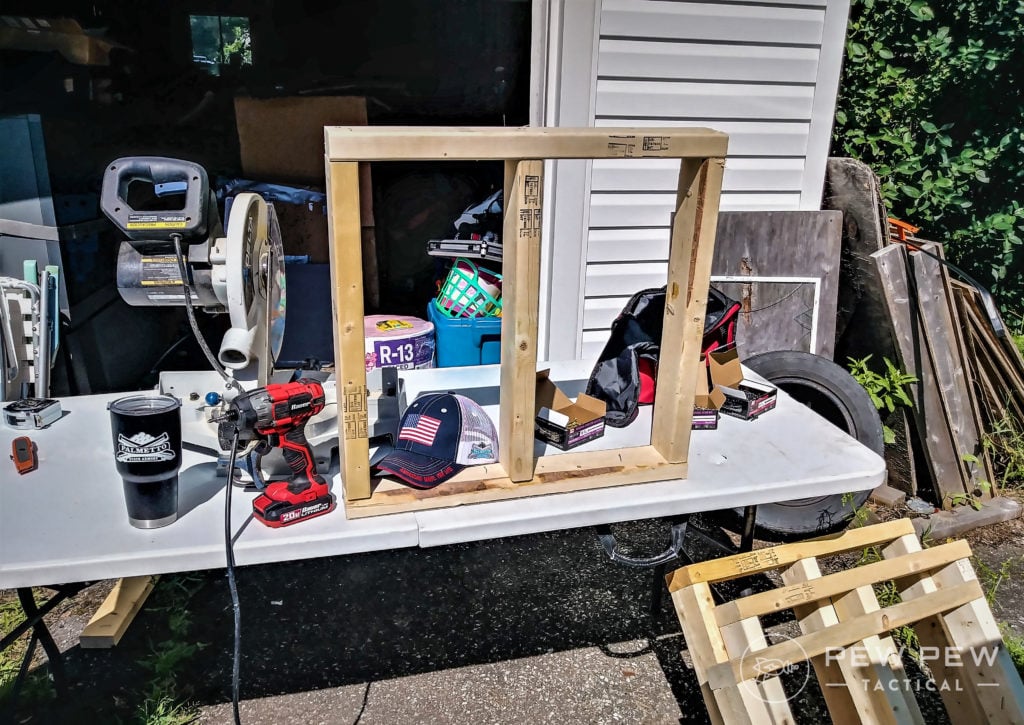
Calibers that were tested included the 9x19mm, and the venerable .45 ACP.
How did they stack up?
Let’s find out if pistol calibers tear through soft tissue and drywall like a wet tissue.
The Handguns and Ammo
With this test, I chose 2 common handgun calibers for better experimental accuracy. Striker-fired, semi-automatics were chosen due to their popularity.
For the 9x19mm, a Polymer 80 PF940Cv1 80% frame was used that was sent to me by JSD Supply. They supplied the barrel, frame and all the part kits associated with a Glock 19 build. The PATMOS barrel has proven to be very accurate.
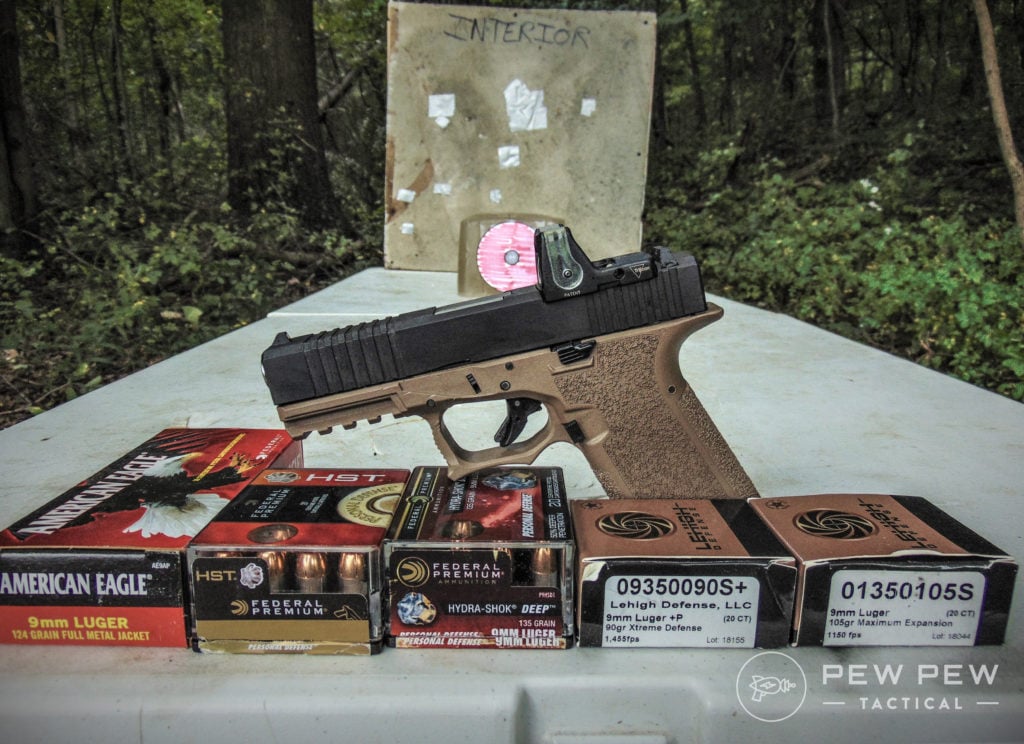
The slide and the Trijicon RMR was furnished by Brownell’s. Aesthetically, I love the look of the Brownell’s slide. I am a fan of keeping it simple, and the slide is stylish and functional.
Prices accurate at time of writing
Prices accurate at time of writing
-
25% off all OAKLEY products - OAKLEY25
Copied! Visit Merchant
I can’t speak highly enough on the Trijicon RMR. At this point, if you are building a Glock slide, don’t think twice. Get the RMR cut and plant an RMR on it. It’s a beautiful marriage of looks and functionality.
Prices accurate at time of writing
Prices accurate at time of writing
-
25% off all OAKLEY products - OAKLEY25
Copied! Visit Merchant
For the .45 ACP, my personal Glock 36 was used. This model uses a single stack, six-round magazine and is purpose-built to be a small yet powerful conceal carry handgun.
It has been highly reliable and further cement Glock’s reputation in my opinion. It is still a complete factory set up, and nothing has been changed since I bought it years ago.
Ammo supplied for testing came from Remington, Hornady, Federal, Inceptor, and Lehigh Defense.
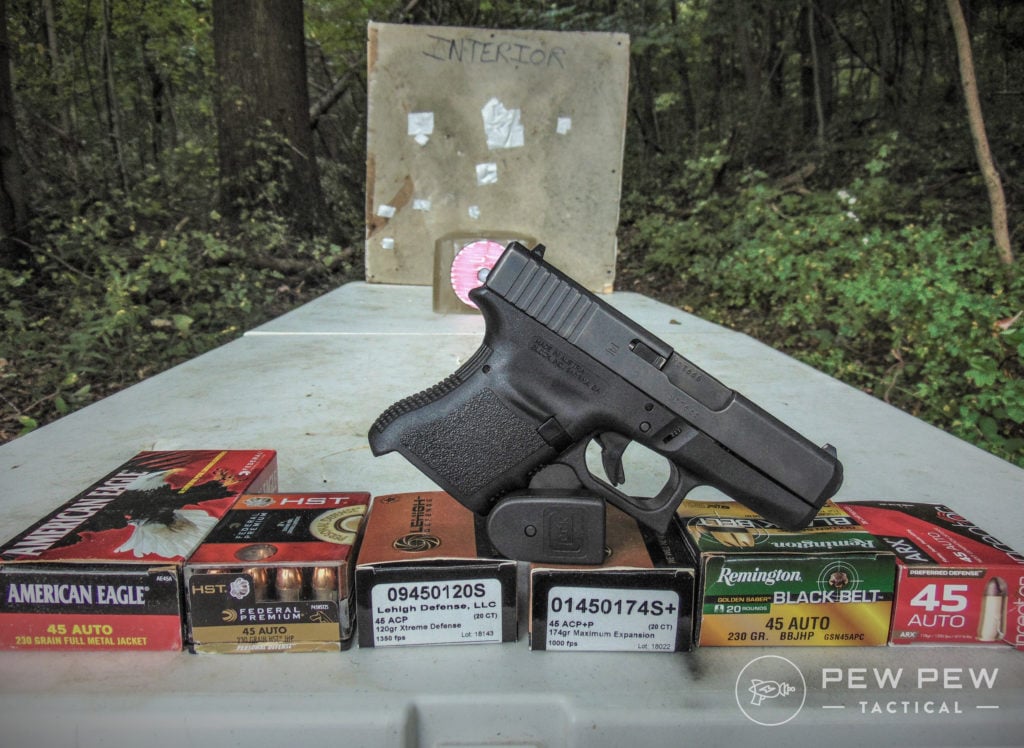
All ammunition was tested with a “clear miss” shot. Not surprisingly, every round that missed the 12” of 10% ballistic gel passed through both walls and out of the “house”.
9x19mm Penetration Results:
| 9mm Ammo | 12” Ballistic Gel | Interior Wall | Exterior Wall |
|---|---|---|---|
| American Eagle 115 grain FMJ | Pass Through | Pass Through | Pass Through |
| Hornady 124 grain Critical Defense | Pass Through | Stopped in Wall | N/A |
| Federal 124 grain Hydra Shok Tactical | Pass Through | Stopped in Wall | N/A |
| Federal 135 grain Hydra Shok Deep | Pass Through | Stopped by Wall (Found on Ground) | N/A |
| Lehigh Def. 105 grain Maximum Expansion | Stopped In Gel | N/A | N/A |
| Lehigh Def. 90 grain Extreme Defense +P | Pass Through | Pass Through | Stopped in Wall |
Best 9mm Home Defense Loads:
1. Federal Premium 124-grain Hydra-Shok Tactical & 135-grain Hydra-Shok Deep
Both loads worked great from Federal Premium, which is why I grouped them together.
Both showed great expansion, and after passing through 12” of ballistic gel, the first interior wall was able to stop the expanded slugs.
While the 135-grain Hydra-Shok Deep did penetrate further, the slug was found on the ground right behind the interior wall.
Prices accurate at time of writing
Prices accurate at time of writing
-
25% off all OAKLEY products - OAKLEY25
Copied! Visit Merchant
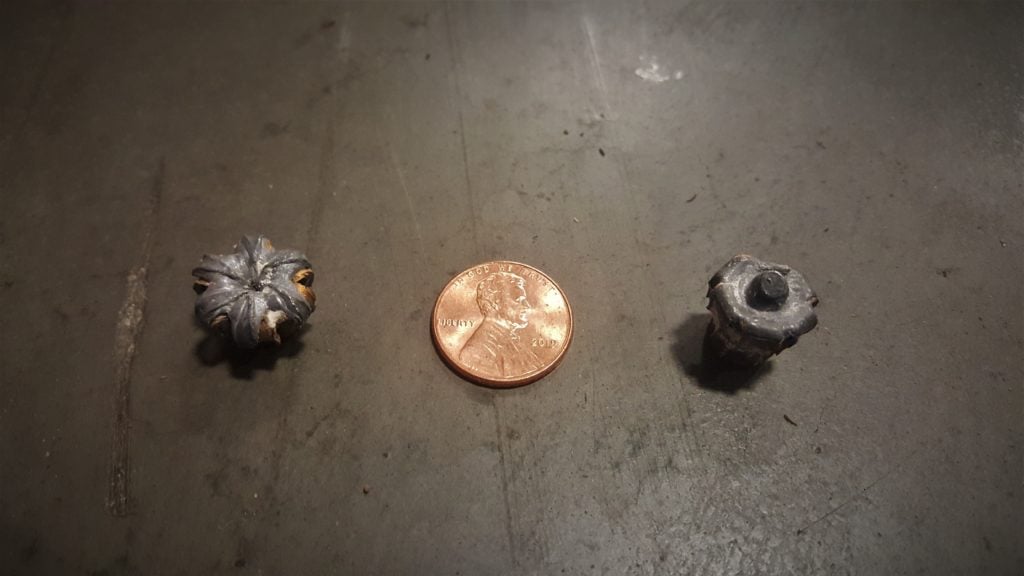
Either of these rounds would be excellent choices for home defense where over-penetration could be a concern, and it shouldn’t be a surprise.
Federal Premium’s pedigree with quality ammunition is well known.
Where the Hydra-Shok Deep penetrated more, it is by design, where barriers may be a concern with carrying for defense.
Prices accurate at time of writing
Prices accurate at time of writing
-
25% off all OAKLEY products - OAKLEY25
Copied! Visit Merchant
The Hydra-Shok Tactical may be a better choice for in the home.
2. Lehigh Defense 105-grain Maximum Expansion
The Lehigh Defense Maximum Expansion line is something to truly behold for self-defense. It truly lives up to its name of Maximum Expansion.
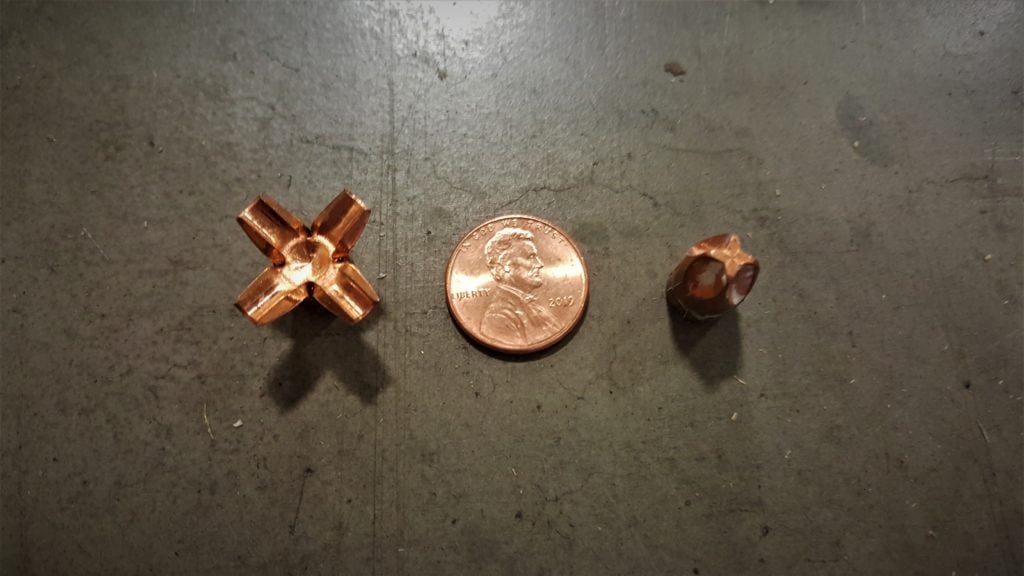
I tested this ammunition a few times to make sure that there wasn’t a fluke. Each time, penetration was 10.5” inside of the 12” of ballistic gel and expansion was predictable.
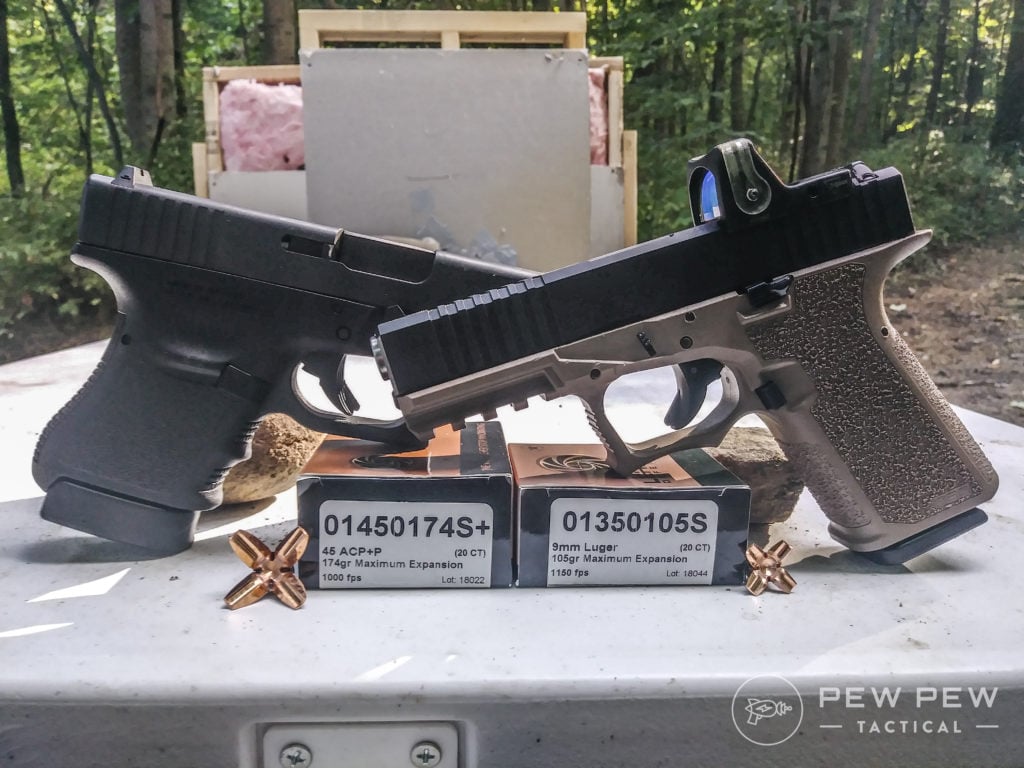
Each copper projectile opened its four petals causing impressive wound channels, and I can’t even imagine what they might do to soft tissue.
If you are in the market for defensive ammo that will not pass through an intruder, this is the top pick.
Prices accurate at time of writing
Prices accurate at time of writing
-
25% off all OAKLEY products - OAKLEY25
Copied! Visit Merchant
While exit wounds cause more trauma, and allow more hemorrhaging, all kinetic energy would be dumped into a target using the Maximum Expansion bullet from Lehigh Defense.
3. Hornady 124-grain Critical Defense
Hornady Critical Defense didn’t disappoint.
After passing through the 12” of gel, the expanded slug impacted the interior wall and passed only through the first sheet of 3/8” drywall.
After removing the sheet of drywall, I found the slug resting on the bottom 2×4 plate of the simulated wall.
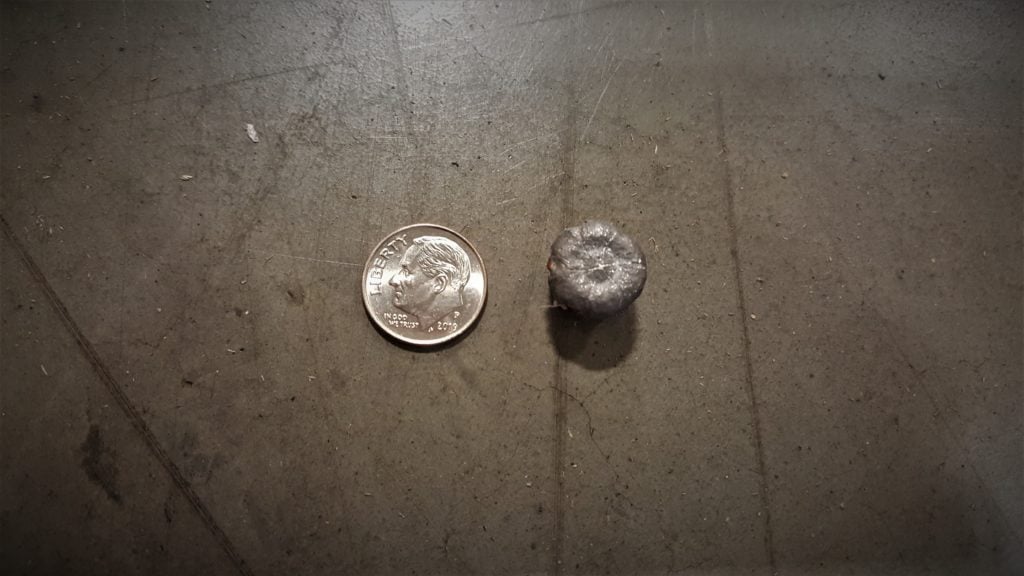
It was still hot as well!
The expansion was not quite as large as the Federal Premium, or the Lehigh Defense, but in terms of over-penetration, this round performed great.
Prices accurate at time of writing
Prices accurate at time of writing
-
25% off all OAKLEY products - OAKLEY25
Copied! Visit Merchant
If expansion is more important in your opinion, the Federal or Lehigh Defense option would be a better choice.
.45 ACP Penetration Results:
| .45 ACP | 12” Ballistic Gel | Interior Wall | Exterior Wall |
|---|---|---|---|
| American Eagle 230 grain FMJ | Pass Through | Pass Through | Pass Through |
| Federal Premium 230 grain Hydra-Shok | Pass Through | Stopped by Wall (Found on Ground) | N/A |
| Remington 230 grain Black Belt | Pass Through | Pass Through | Stopped in Wall |
| Inceptor 118 grain ARX | Pass Through | Pass Through | Pass Through (Fractured and Broken) |
| Lehigh Def. 174 grain Maximum Expansion | Stopped in Gel | N/A | N/A |
| Lehigh Def. 120 grain Extreme Defense | Pass Through | Pass Through | Stopped in Wall |
Best .45 ACP Home Defense Loads:
1. Federal Premium 230-grain Hydra-Shok Tactical
Just like the 9mm, the bigger brother in .45 ACP performed amazingly. Expansion was even more significant with the larger bullet.
The bullet, after penetrating 12” of gel, was stopped by the first interior wall and was found lying on the ground. Expansion was large, and the wound channel was impressive after cutting open the block later.
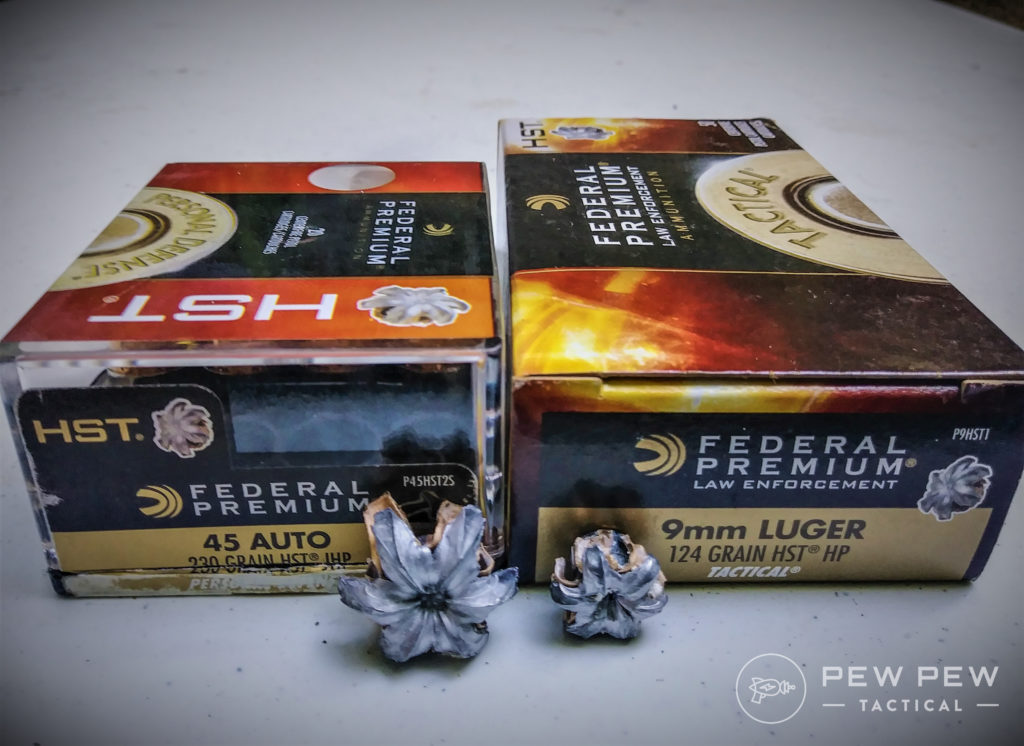
I tested this round a few times, and every time there was no surprise. Expansion was the same, and the first wall always was able to stop the projectile from flying downrange.
Prices accurate at time of writing
Prices accurate at time of writing
-
25% off all OAKLEY products - OAKLEY25
Copied! Visit Merchant
Federal Premium’s widely known Hydra-Shok bullet is something of a gold standard to judge other bullets. You can not go wrong with them.
2. Lehigh Defense 174-grain Maximum Expansion
The Maximum Expansion in .45 ACP was surprising. After firing, it was obvious that the bullet did not penetrate out of the 12” of ballistic gel.
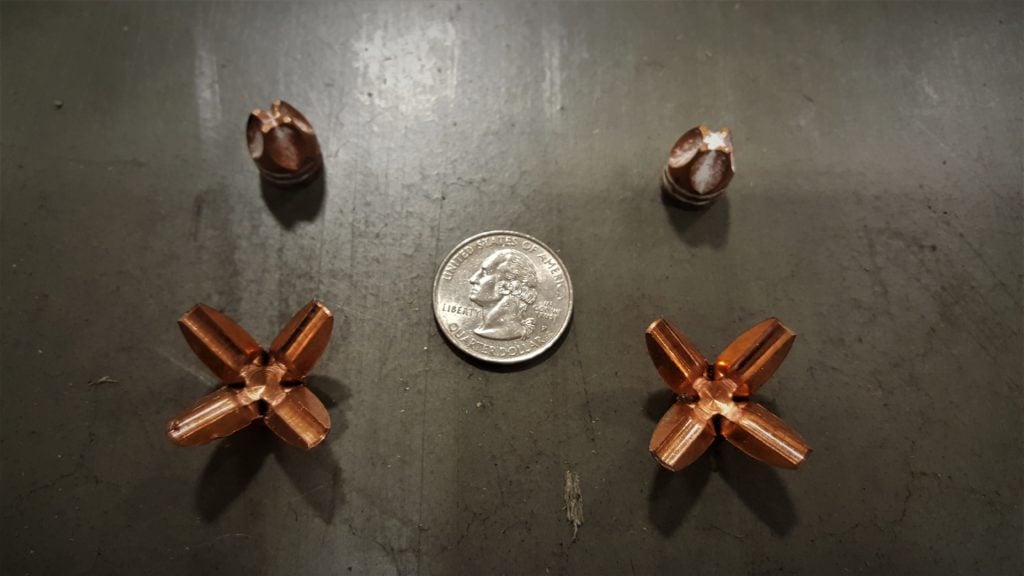
Cutting open the block revealed that 10.5” of penetration was achieved, but the expansion was what was even more notable. The .45 caliber projectile opened to double its size with four large, sharp, copper petals.

The bullet is designed not to expand with harder materials such as bone, wood, and auto glass, but expands rapidly within soft tissue.
Lehigh Defense has a winner with the Maximum Expansion for home defense.
Prices accurate at time of writing
Prices accurate at time of writing
-
25% off all OAKLEY products - OAKLEY25
Copied! Visit Merchant
While it is expensive, this is not plinking ammo, and God willing, you will not have to go through more than a few boxes in your life for accuracy and testing of feeding.
3. Remington 230-grain Black Belt
The new addition to the Remington line-up in the Black Belt performed well.
Expansion wasn’t as large as the previously mentioned bullets, and the slug came to a rest in the second wall. For this test though, the ammunition proved to be a solid performer with a balanced level of expansion and penetration.
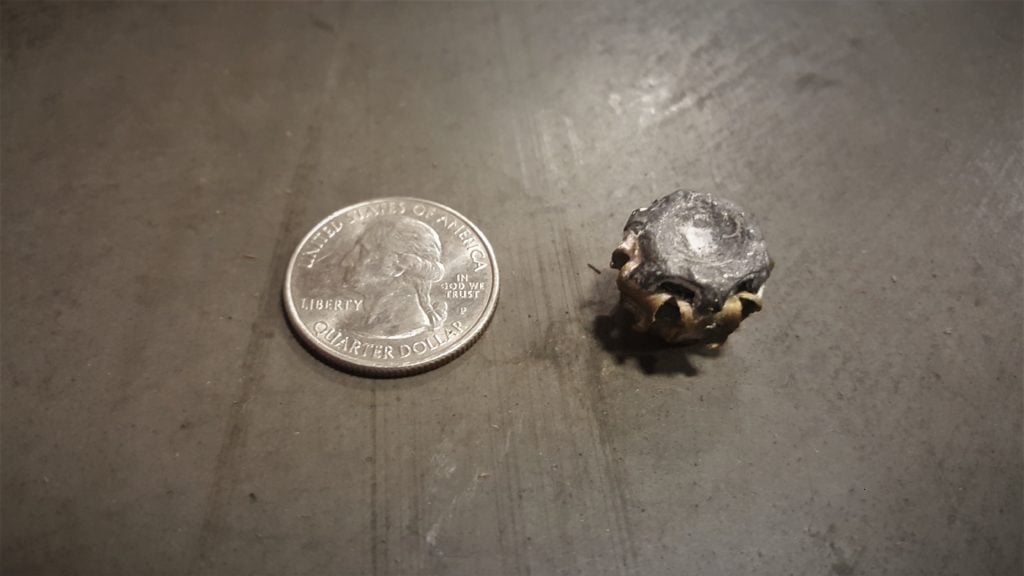
This bullet has been tested in defensive situations including auto glass, wood, and heavy clothing where extra penetration is needed to get the job done by the FBI.
Prices accurate at time of writing
Prices accurate at time of writing
-
25% off all OAKLEY products - OAKLEY25
Copied! Visit Merchant
It is purposely designed to be a jack of all trades, and in my testing, it proved a viable option for home defense.
Pros and Cons for The Handgun
The handgun is an extremely popular firearm.
Many people who carry a handgun day-to-day will naturally gravitate towards this firearm for home defense.
A handgun is a compact, light firearm that is a good choice for home defense, but it does have its weaknesses.
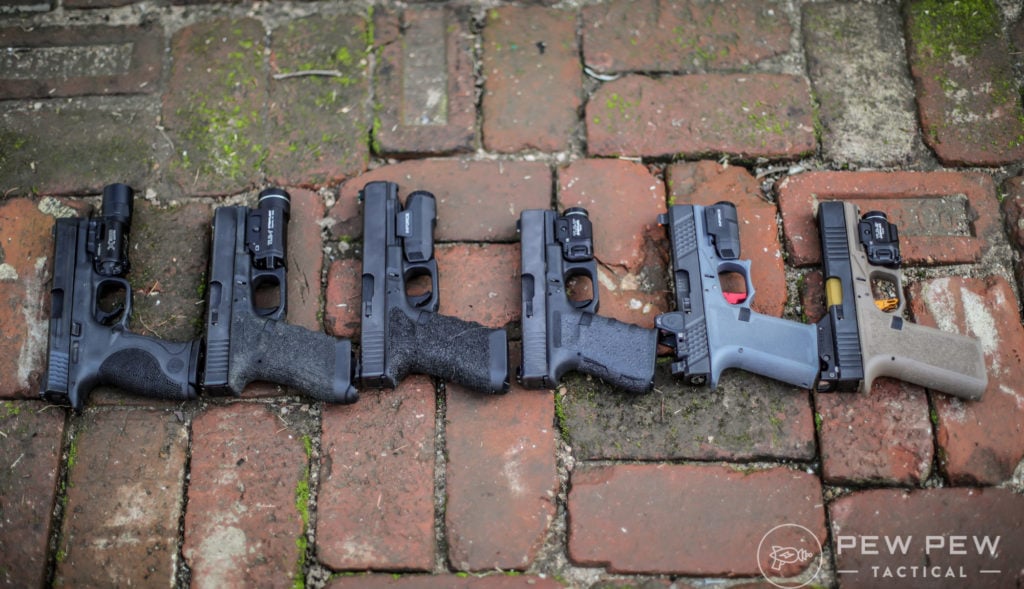
Projectiles for a handgun are large, short, and heavy by nature. With a clean miss, slugs tend to keep barreling through barriers.
But, a properly designed self-defense bullet has shown to be suitable for home defense when the projectile encounters soft tissue in my testing.
In a high-stress situation like a home invasion, acquiring your sights in low light may be problematic. While a red dot mounted on the slide of a handgun is a quick way to get on target, keeping rounds on target can still be a challenge when your heart rate is off the charts.
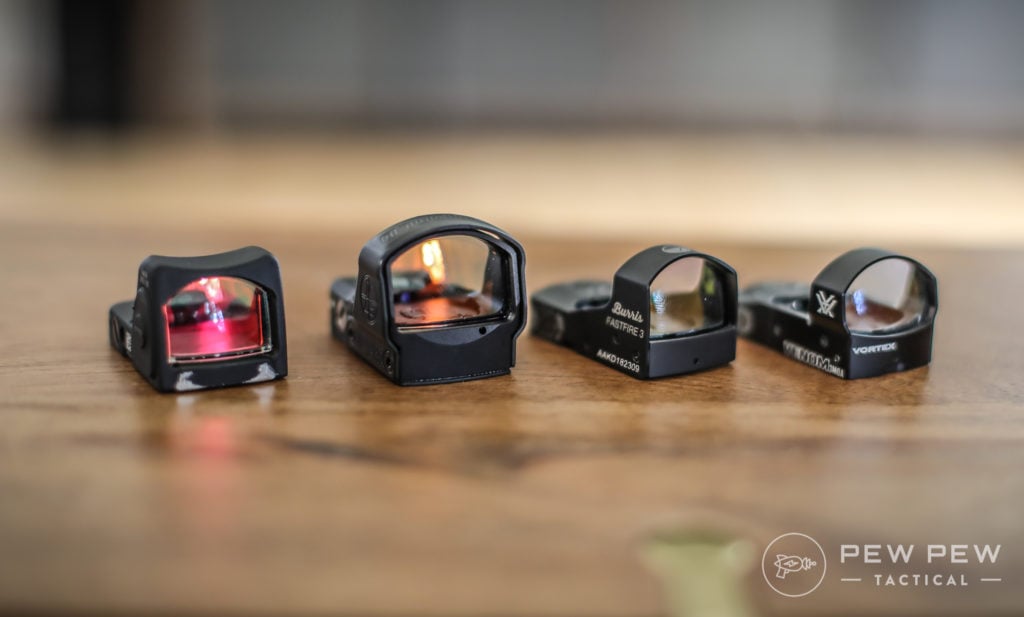
Not having a stock planted in your shoulder is a major drawback in an accurate volume of fire.
Terminal ballistics are also not comparable to a rifle cartridge either. Law enforcement and self-defense shootings show that multiple rounds are needed to incapacitate someone in a defensive situation.
Shot placement is key with a handgun so regular training behind a handgun is important.
Final Handgun Grade
Kinetic Energy: 3/5
Regardless if you shoot the baby 9mm, or your 1911 won back to back World Wars, kinetic energy is lacking compared to the shotgun and rifle. It will get the job done, but shot placement is key.
Wound Channels: 3.5/5
Velocity levels are relatively low in most pistol cartridges, so wound channels and temporary wound channels tend to be less than a centerfire rifle. The larger a projectile expands though, the more damage a slug can do.
Over-Penetration: 4/5
While it should be widely known that FMJs over-penetrate soft tissue, quality self-defense ammunition slows quickly due to rapid expansion.
A clean miss is going to blow through multiple walls without issue, but if you make the hit count, it is going to stop within the target or stay in the first wall it encounters.
Recoil Management: 4/5
Recoil in most common defensive cartridges is manageable. It does require training, and proper grip though. An AR in a PCC would make recoil much more manageable for home defense.
Overall for Home Defense: 3.5/5
In the right hands, and with the right load, a handgun can be a viable weapon to defend your home with. I can’t stress enough that training needs to happen in preparation.
Shooting under stress with a handgun can be difficult, and if you need to defend yourself, you need to make the hits count.
Rifle Over-Penetration Testing
Some people are highly skeptical of a rifle, specifically the AR-15, for home defense. Some consider it a bad fit for home defense, due to over-penetration.
To find out, I went about setting up a test just like the shotgun and handgun. It involves shooting a 12” 10% ballistic gel block that is calibrated to FBI specifications.
Behind the ballistic gel, I placed a simulated interior wall used of common construction materials.

Ten feet behind the interior wall, I placed a larger exterior wall composed of 2”x4” studs, 3/8” drywall sheeting, R13 insulation, and ½” plywood. Calibers tested include 5.56 NATO/.223 Remington, and the .300 Blackout.
Is the AR15 the best defensive weapon for your home?
Or are you at risk of shooting your neighbor’s neighbor? Does it over-penetrate like a railgun from Eraser with Arnold Schwarzenegger?
Let’s find out below!

The Rifles and Ammo
For the 5.56 NATO, the rifle I used in testing was a Bushmaster Minimalist.
With its mil-spec receivers, 16” nitride barrel, proprietary “tear-drop” free-floated handguard, and lightweight Mission First Tactical Minimalist stock, it made a great test rifle to use for home defense.
Prices accurate at time of writing
Prices accurate at time of writing
-
25% off all OAKLEY products - OAKLEY25
Copied! Visit Merchant
I have used this weapon while hunting, and while testing different loads for accuracy, and I have yet to encounter a stoppage. The optic used was an ACME Machine 1-8x FFP MOA optic with an Aero Precision 34mm SPR mount.
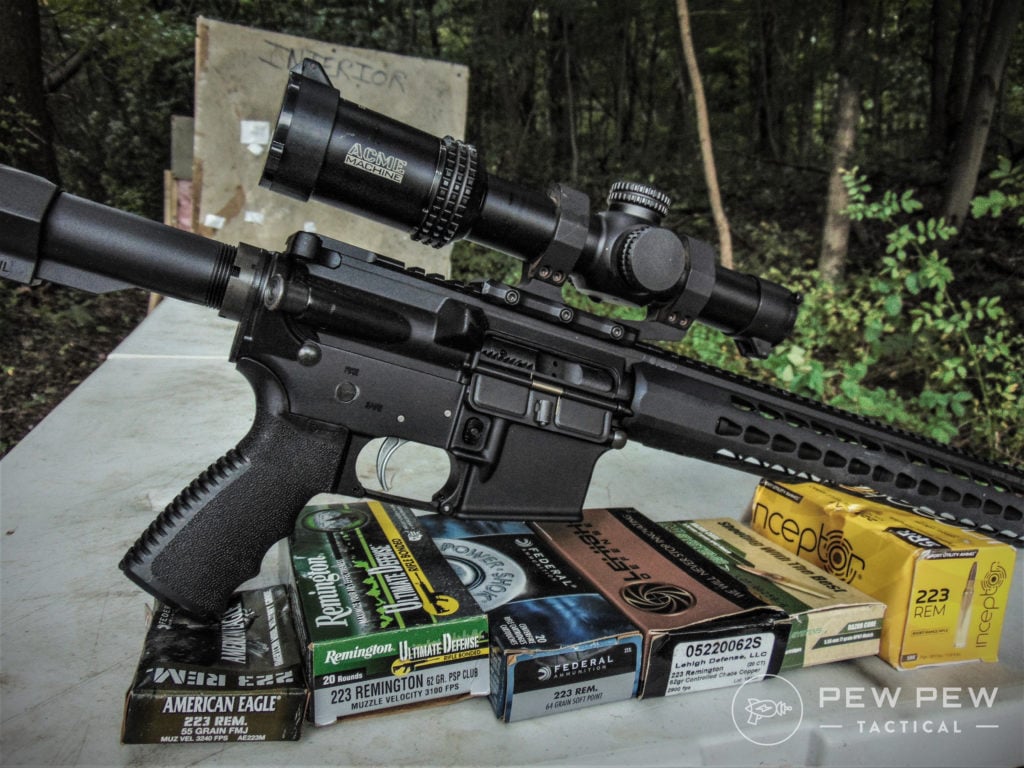
It has yet to lose zero on the range, or while bouncing around a truck while hog hunting in Texas. Turret adjustments have always been accurate as well.
The .300 Blackout is my personal AR15 pistol that I built. It uses an 8.2” Rosco Manufacturing nitride barrel, a BCM MCMR 8” handguard, Toolcraft BCG, and an SBA3 pistol brace sent to me by SB Tactical.
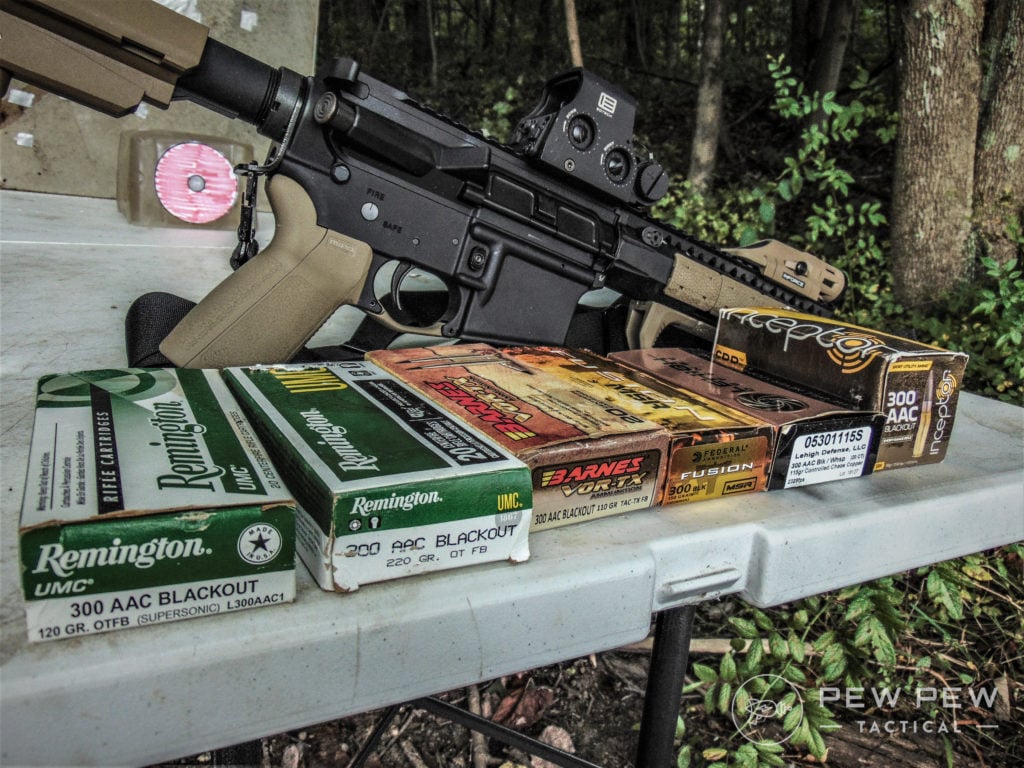
Prices accurate at time of writing
Prices accurate at time of writing
-
25% off all OAKLEY products - OAKLEY25
Copied! Visit Merchant
This has been my favorite brace they have came out with, and I have used most of the models on the market.
We also have a hands-on review of the Best AR and AK Braces.
The optic that was used is an EOTech XPS3-0 holographic weapon sight. EOTech has always been a solid performer for me when I first bought a 512 model years ago.
For up-close work, the EOTech 65 MOA reticle performs well and is quick to get on target.
Prices accurate at time of writing
Prices accurate at time of writing
-
25% off all OAKLEY products - OAKLEY25
Copied! Visit Merchant
Ammunition was sent to me by multiple companies, including Remington, Barnes, Federal Premium, Inceptor, and Lehigh Defense. The results may surprise you.
5.56 NATO/.223 Remington Results:
| 5.56 NATO | 12” Ballistic Gel | Interior Wall | Exterior Wall |
|---|---|---|---|
| American Eagle 55gr | Pass Through | Pass Through (Keyholing) | Pass Through (Keyholing) |
| Remington 62gr Ultimate Defense | Pass Through | Stopped In Wall | N/A |
| Federal 64gr Power-Shok SP | Pass Through | Stopped In Wall (Jacket Separation) | N/A |
| Inceptor 35gr SRR Frangible | Pass Through | Pass Through (Broken) | Stopped In Wall |
| Lehigh Defense 62gr Controlled Chaos | Pass Through (Fragmented) | Pass Through (Base Only) | Pass Through (Base Only) |
| IMI Defense 77gr | Pass Through (Jacket Separation) | Pass Through (Lead Core) | Stopped In Wall |
Best 5.56 NATO/.223 Remington Home Defense Loads:
1. Remington 62-grain Ultimate Defense PSP (Bonded)
Shooting this load proved that Remington accomplished everything it claims.
My first shot had perfect expansion and imbedded into the first sheet of drywall after passing through the 12” of ballistic gel.
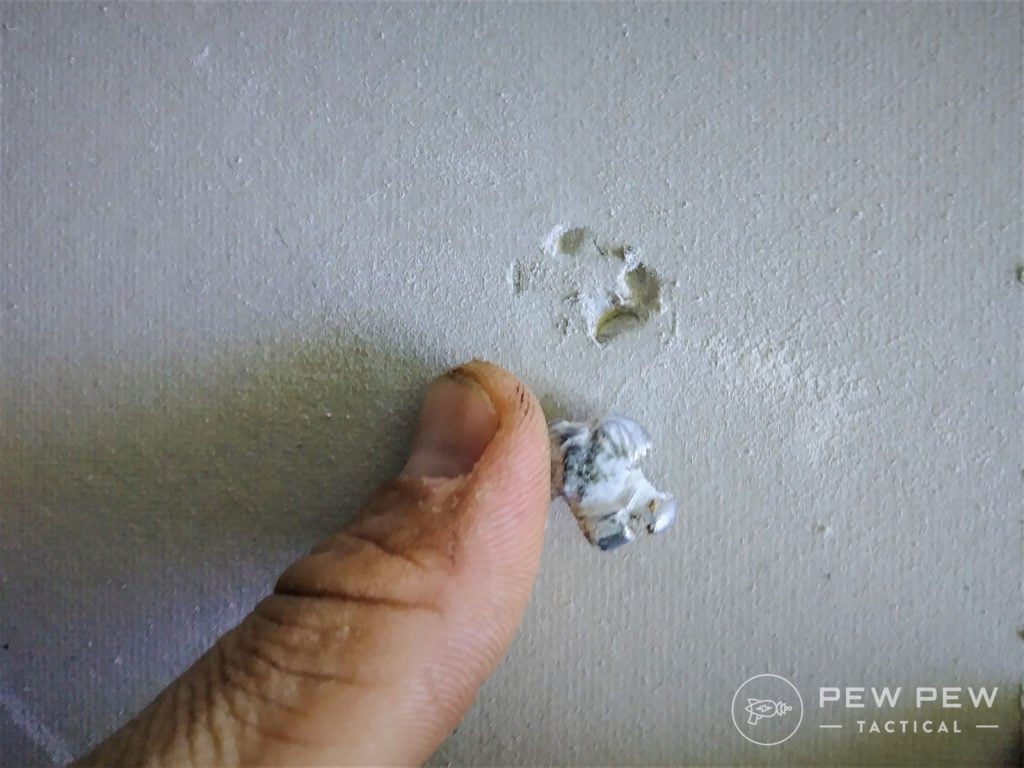
I was so impressed that I later fired 5 more shots into a 16” block of 10% ballistic gel.
Every single time, the 62-grain bonded bullet expanded into a 5-leaf clover shape and had 12” of penetration.
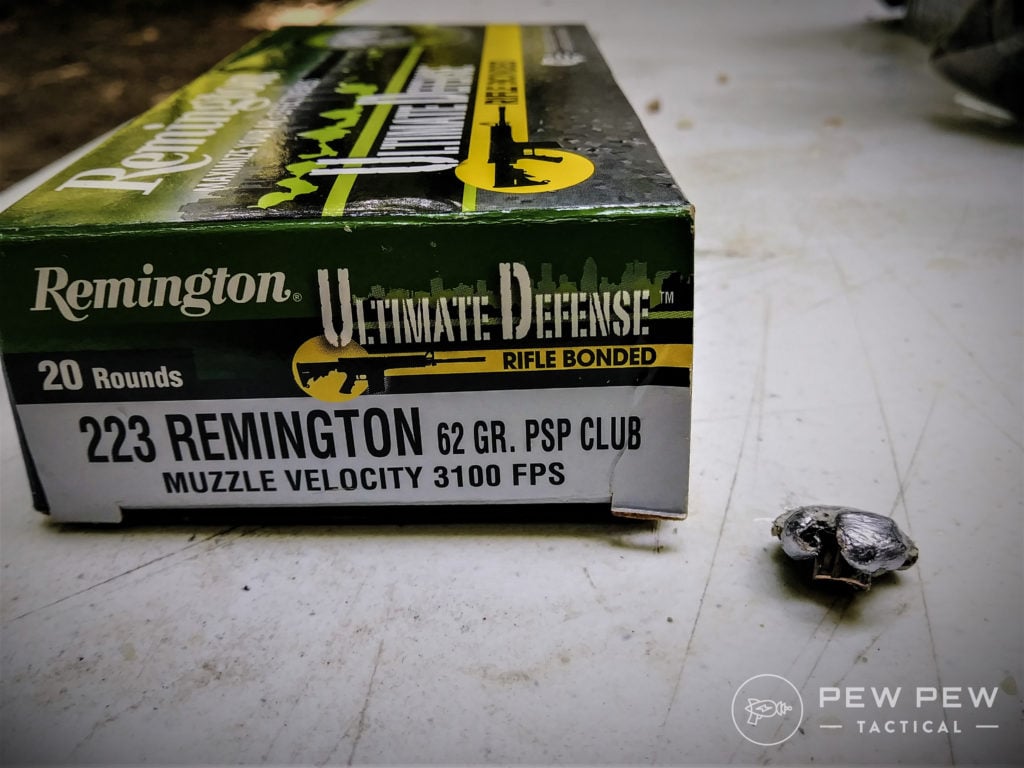
The metallurgical bonding of the copper jacketing and lead core makes for a lethal combination in a pointed soft point with great terminal ballistics.
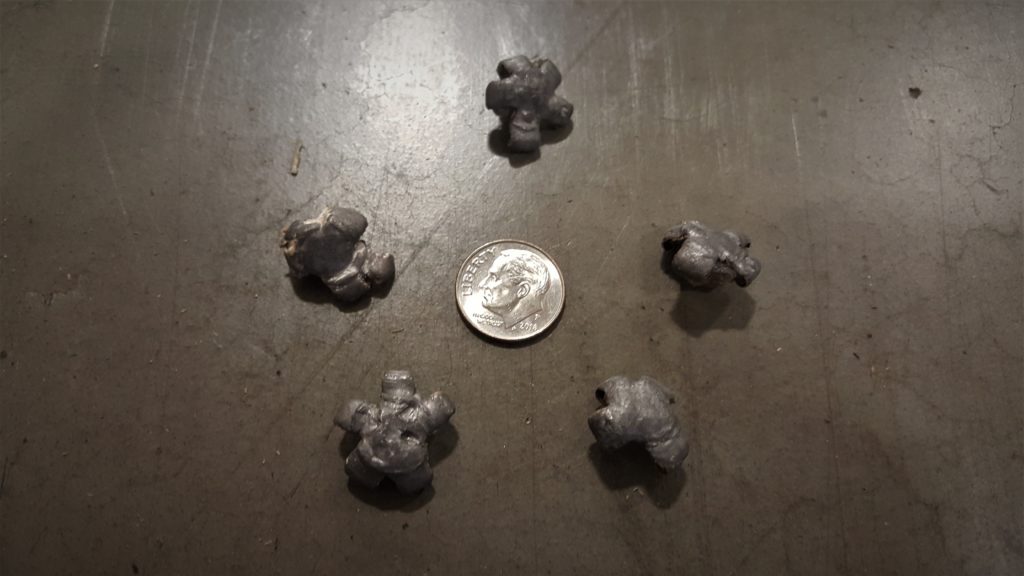
Prices accurate at time of writing
Prices accurate at time of writing
-
25% off all OAKLEY products - OAKLEY25
Copied! Visit Merchant
2. Federal Premium 64-grain Power-Shok SP
The Federal load also did well. My first shot stayed inside of the first wall, but there was jacket separation.
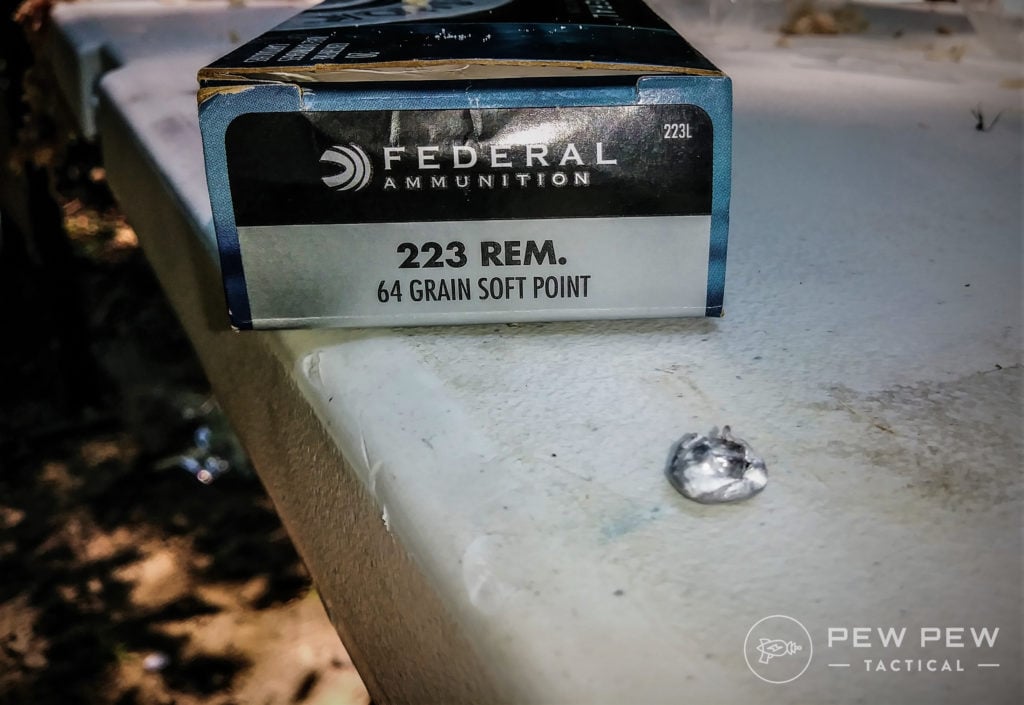
The copper jacketing embedded into the first sheet of drywall, while the lead core was found inside of the wall with a reasonably sized mushroom.
I tested this round 3 more times, and half of the time there was a complete jacket separation.
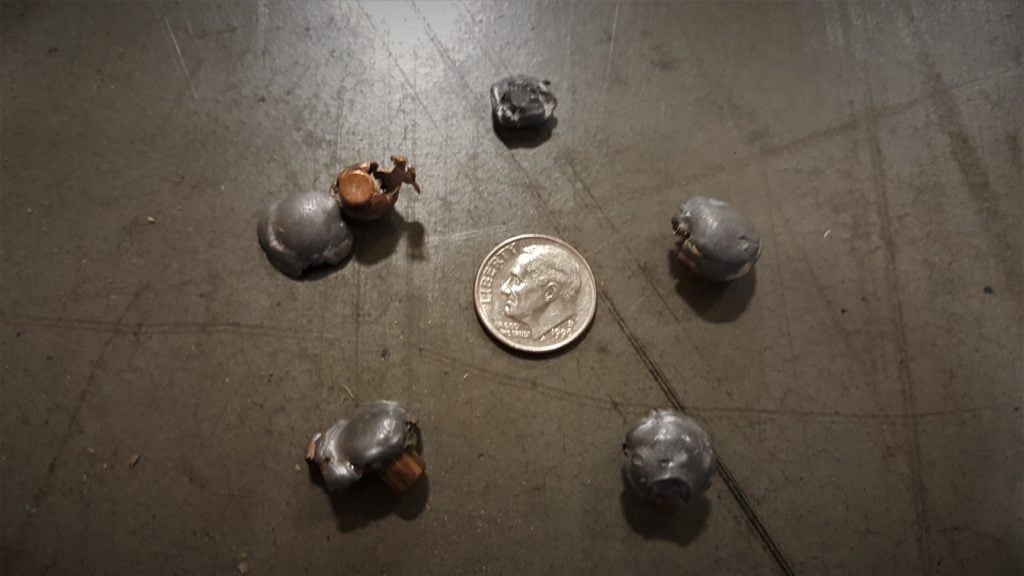
Prices accurate at time of writing
Prices accurate at time of writing
-
25% off all OAKLEY products - OAKLEY25
Copied! Visit Merchant
This bullet did very well for a standard soft-point, but weight retention did suffer. One test shot barely indented the first sheet of drywall.
3. Inceptor 35-grain Frangible
This frangible option with Inceptor is a relatively new design of bullet. It is made of a polymer and copper matrix.
It is designed to disintegrate upon striking anything harder than itself. It did not over-penetrate through the simulated walls of the “house” though even though some shots fragmented more than others, probably depending on how it tumbled through the first wall.
After encountering soft tissue, the Inceptor 35-grain bullet tumbled violently.
When firing a “clean miss”, this load was the only cartridge that did not over-penetrate, although it did hit a stud. A copper-colored dust cloud was all that remained on the other side of the interior wall.
Prices accurate at time of writing
Prices accurate at time of writing
-
25% off all OAKLEY products - OAKLEY25
Copied! Visit Merchant
Another “clean miss” shot was done and missing a 2×4 stud the bullet passed through both walls.
Wound channels were not as great as the other options, but for the sake of this experiment, this frangible bullet did very well.
.300 Black Out Results:
| 300 Blackout | 12” Ballistic Gel | Interior Wall | Exterior Wall |
|---|---|---|---|
| Remington 120gr OTM | Pass Through | Pass Through (Keyholing) | Pass Through (Fragmenting) |
| Remington 220gr OTM (Subsonic) | Pass Through | Pass Through | Pass Through (Keyholing) |
| Inceptor 88gr Frangible | Pass Through | Pass Through | Fragments Stopped in Wall |
| Barnes VOR-TX 110gr | Pass Through | Stopped in Wall | N/A |
| Lehigh Defense 115gr Controlled Chaos | Pass Through (Fragmented) | Pass Through (Base Only) | Stopped in Wall |
| Federal Fusion 150gr | Pass Through | Pass Through | Pass Through (Keyholing) |
Best .300 Black Out Home Defense Loads:
1. Barnes 110-grain VOR-TX TAC-TX
This Barnes load is maximized for the .300 Blackout, and it was the top contender for this caliber. Expansion proved to be reliable, and penetration ended in the first wall after passing through the 12” of ballistic gel.
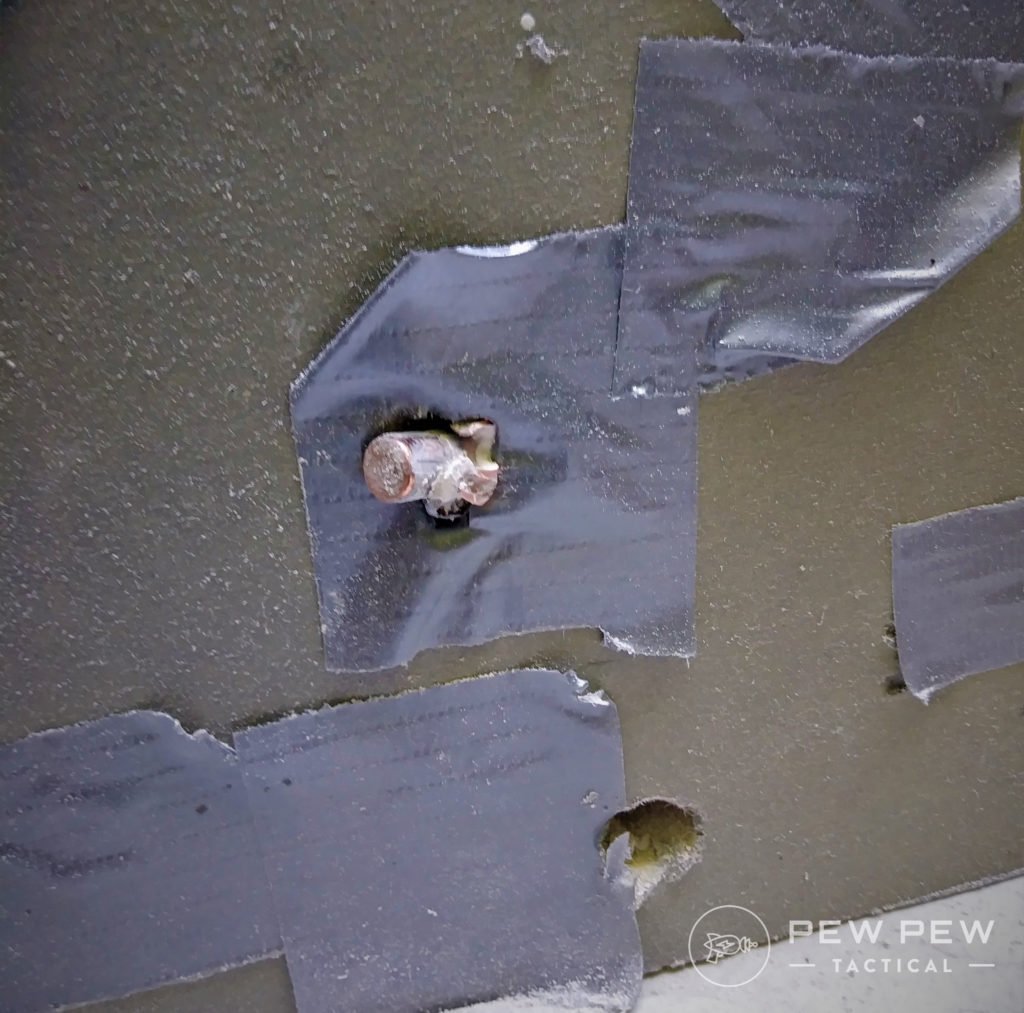
With a whopping 1350 ft. lbs. of kinetic energy at the muzzle, and the amount of expansion, the terminal ballistics on this load are impressive.
I can not recommend this load highly enough, and it exceeded expectations from a rifle cartridge for home defense.
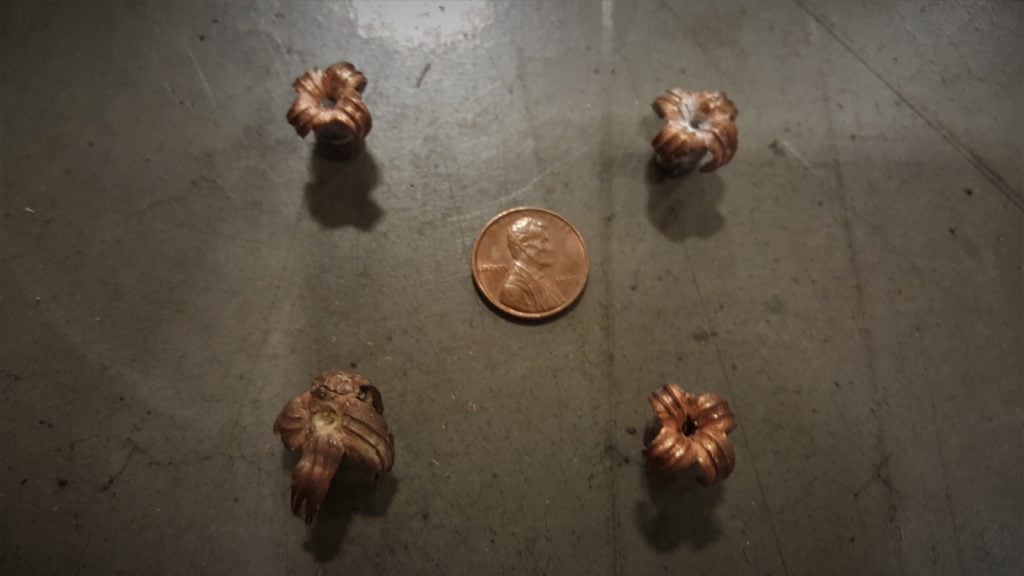
Not only that, but literally ANY .300 BLK barrel has shot this load with insane precision. For hunting, or for home defense, Barnes would be my top choice.
Prices accurate at time of writing
Prices accurate at time of writing
-
25% off all OAKLEY products - OAKLEY25
Copied! Visit Merchant
2. Lehigh Defense 115-grain Controlled Chaos
Where the 62-grain .223 load failed, the 115-grain .300 BLK load pulled through. Both bullets expanded and had great terminal ballistics, but the base of the .223 over-penetrated through both walls.
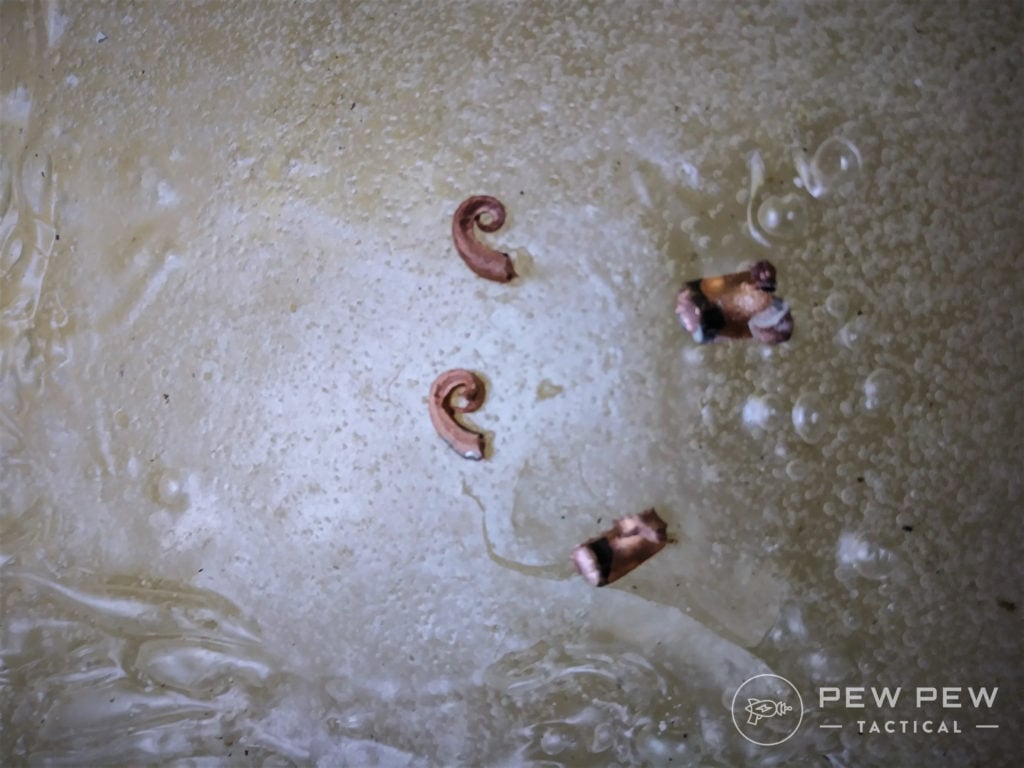
The .300 BLK expanded and then fragmented within the first 6” of gel.
These petals caused secondary wound channels that stayed within the 12” of gel. The base of the projectile passed through the interior wall but ended its travel within the exterior wall.
Prices accurate at time of writing
Prices accurate at time of writing
-
25% off all OAKLEY products - OAKLEY25
Copied! Visit Merchant
Even though the petals are unpredictable, they will wreck soft tissue.
3. Inceptor 88-grain Frangible
Just like the 35-grain .223 Remington load from Inceptor, the .300 BLK did not have amazing terminal ballistics inside of the gel.
This isn’t surprising since it essentially has the profile of an FMJ projectile. The projectile destabilized very well though.
Regarding over-penetration, the Inceptor performed well and shotgunned into multiple fragments after exiting the interior wall.
At 1270 ft. lbs. of energy at the muzzle, this load would cause substantial damage.
Prices accurate at time of writing
Prices accurate at time of writing
-
25% off all OAKLEY products - OAKLEY25
Copied! Visit Merchant
Pros and Cons for The Rifle
Where the handgun comes up short with kinetic energy, and terminal ballistics, the rifle takes the lead. Due to the much faster velocities capable with a rifle cartridge, terminal ballistics are substantially more devastating than a typical handgun cartridge.
Furthermore, stability with a stock or pistol brace under stress is much easier than a handgun.
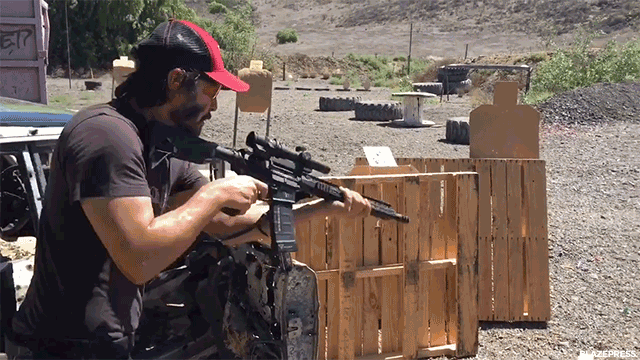
While the shotgun has impressive terminal ballistics, it takes proper training to stay on target and mitigate recoil. Between a 5.56 NATO or a .300 Blackout, recoil levels aren’t in the same class as the shotgun and require less training to be proficient.
Given the proper ammunition selection, the rifle also has less over-penetration than the 12-gauge shotgun.
There are drawbacks to using a rifle cartridge though. Using a typical AR-15 with a muzzle device will produce eardrum piercing and disorienting concussive blasts in smaller rooms and hallways with no hearing protection.
This can be dropped to safer levels with a suppressor but could be cost-prohibitive to a lot of people.
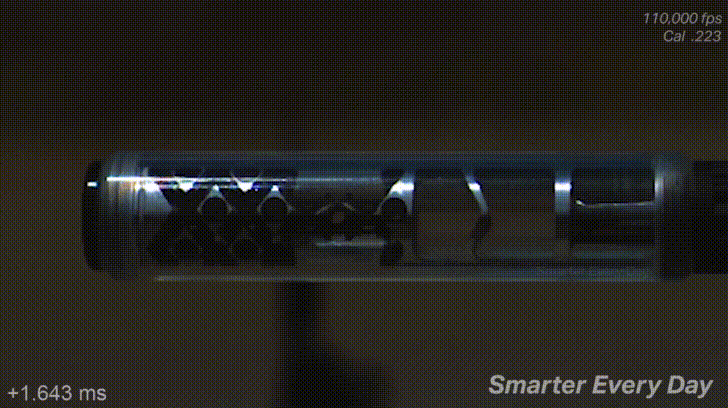
Also, most carbine length ARs are substantially longer than a handgun and require training to properly navigate around corners and around obstacles.
Final Rifle Grade
Kinetic Energy: 5/5
Kinetic Energy is off the charts with centerfire cartridges compared to the handgun. To get the full advantage of the kinetic energy on target, proper ammunition must be used.
Wound Channels: 4.5/5
Wound channels, especially temporary wound channels, are also much more devastating compared to the handgun, or even some shotgun defensive loads. The high velocity of centerfire cartridges, especially in 5.56 NATO are the reason for this.
Over-Penetration: 4/5
Clean misses still have major over-penetration, but the projectiles destabilize much more quickly and lose energy compared to the handgun and shotgun. Especially with 5.56 NATO, due to its long and thin profile.
Recoil Management: 5/5
Recoil management, whether in 5.56 NATO or .300 BLK is some of the easiest to deal with. Using a stock, or a pistol brace helps stabilize the weapon in the shoulder, and fast follow up shots are a breeze without much training behind a weapon.
Overall for Home Defense: 4.5/5
The SBR/Pistol or carbine sized AR15 is one of the absolute best defensive weapons to have at your disposal for home defense.
While there are cons to the platform, especially with the muzzle report in smaller rooms, overall for performance the AR15 is hard to beat in comparison with the handgun or shotgun.
Parting Shots
Okay. We’re done.
A huge amount of time, effort, and testing went into these results and I think we covered all of the important stuff.
What works for you and your home will differ, but now at least you have the tools needed to make the best decision. Maybe you’re already using the best set-up, maybe you need to rethink your home defense plan, either way–you can now do so with confidence and tested results.
What do you think of our testing method? Our results? Does this information change what your HD plan is? Let us know in the comments! For more information on the best home defense ammo, take a look at these articles!

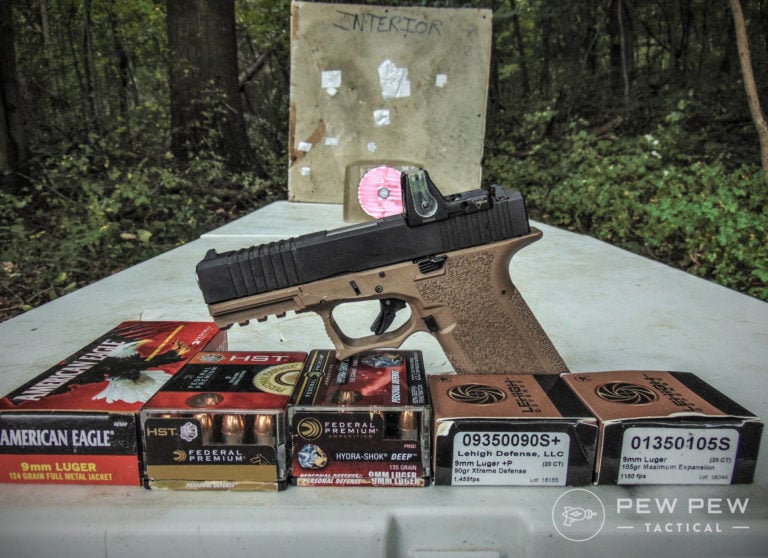

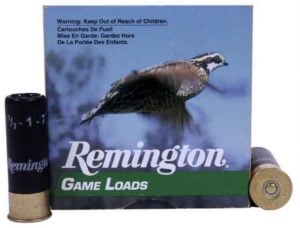
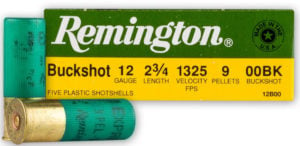
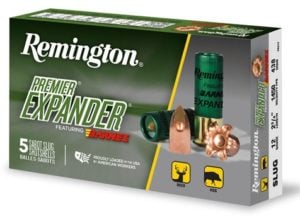
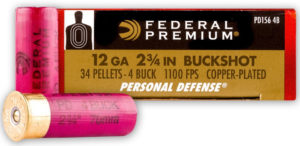
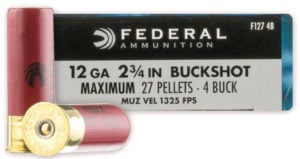
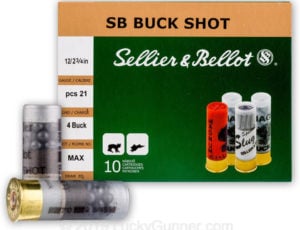
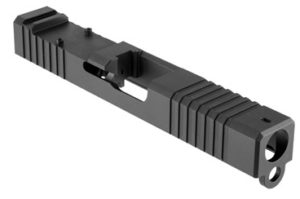
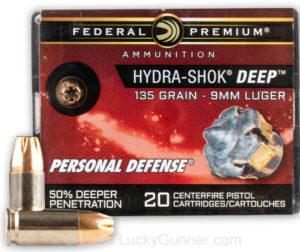
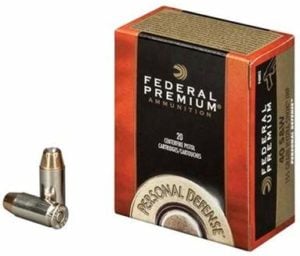
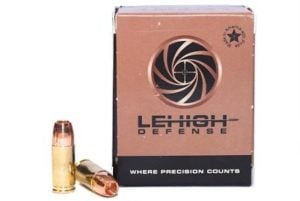
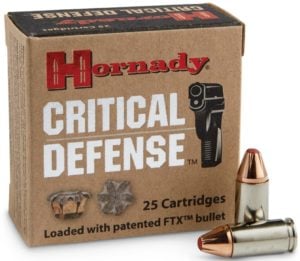
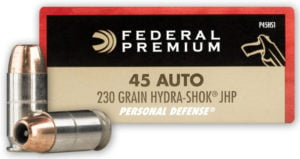
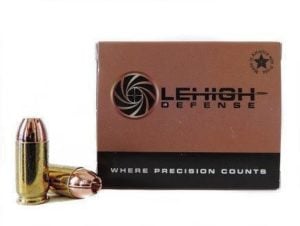
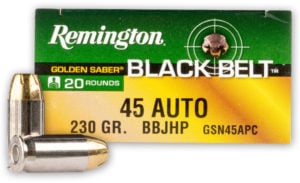

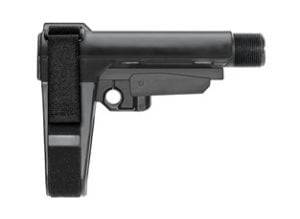
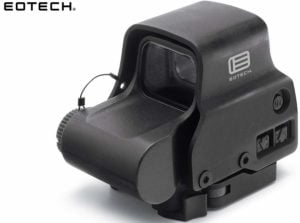
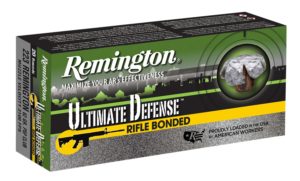
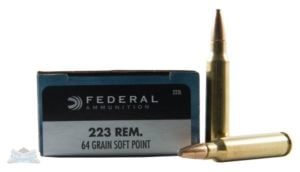
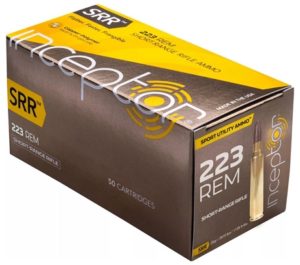
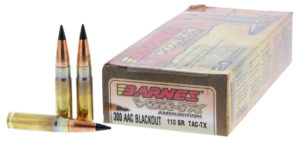
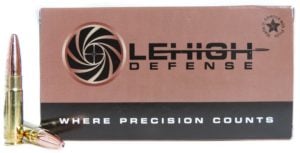
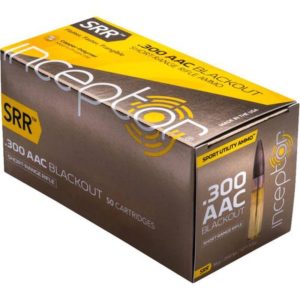




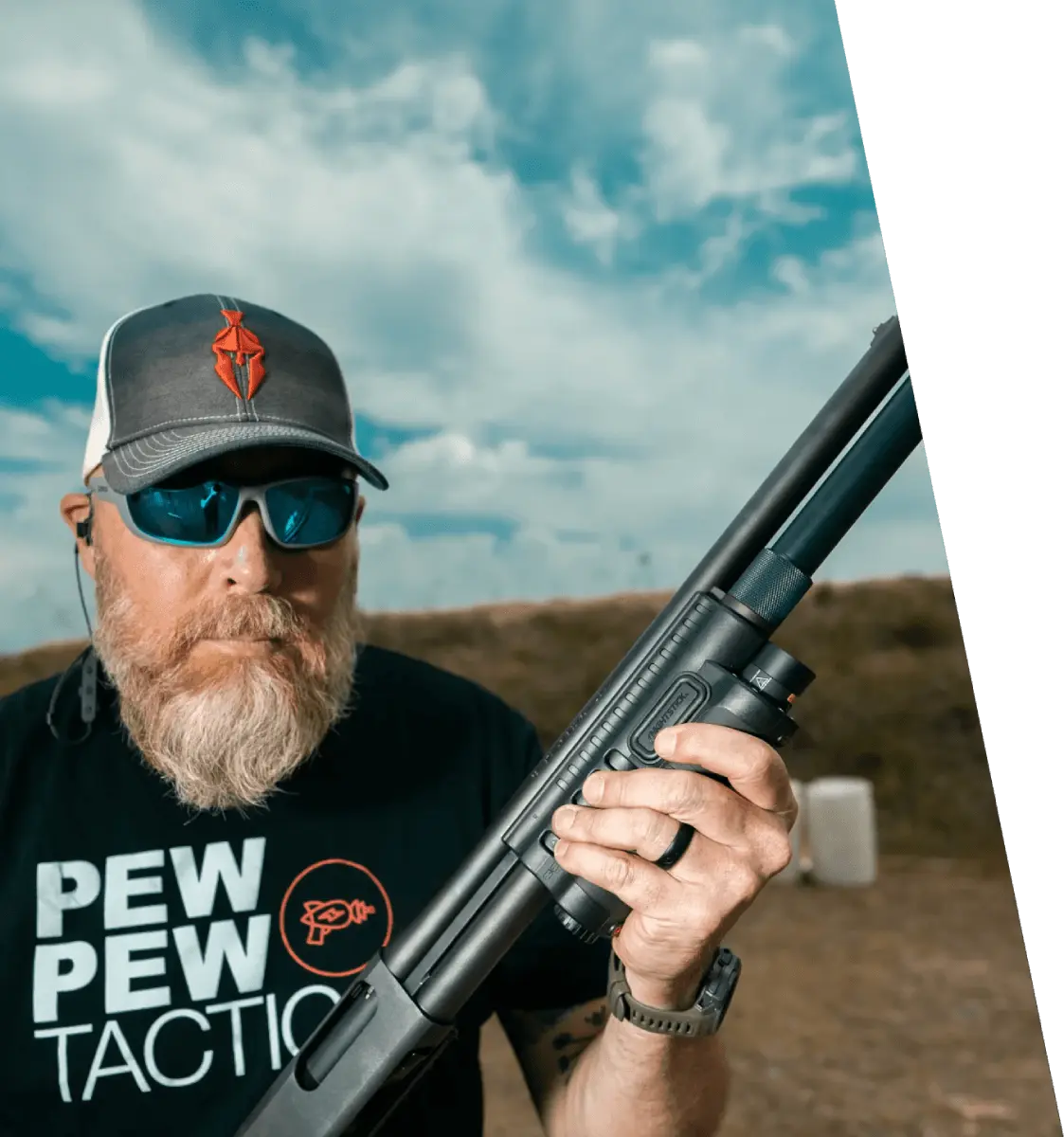

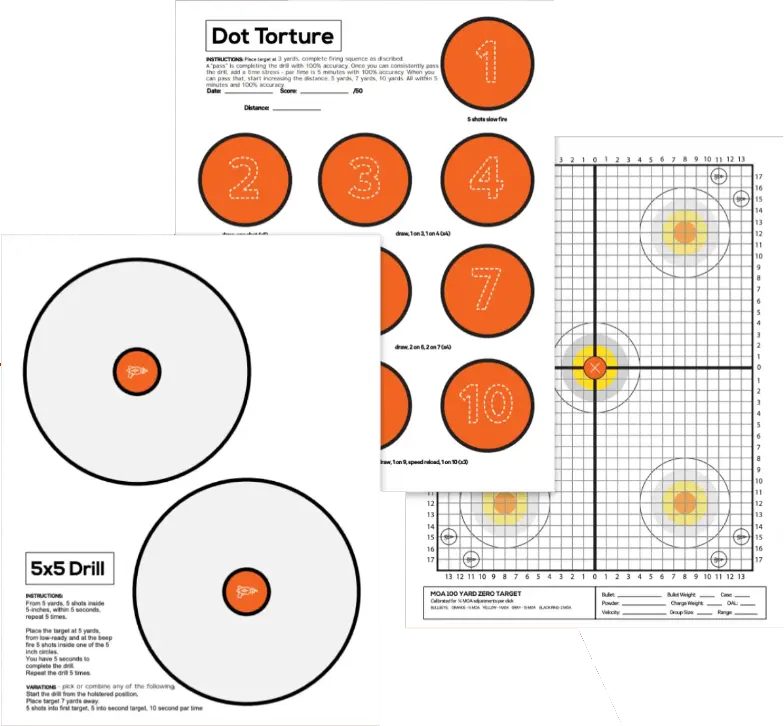
112 Leave a Reply
Thanks for a great article, but I found your conclusions about the AR platform completely wrong. You just showed that in the specific context of over penetration using a rifle round is going to be the worst thing you can do. Yes they have more ammo, and yes they’re easy on the shoulder, and yes very accurate, so I can see the excitement. But out of twelve rounds tested none of them ever stopped in the gel. So if you live in an apartment or smaller home, you’re absolutely impacting a wall that has that dangerous consequences on the other side. I know AR’s are always the cool guy choice when we start talking home defense, but we see over and over again how something designed to be effective at 600 yards isn’t a great option at 5.
Excellent review. Over penetration is certainly a major concern but effective penetration in order to end a threat is just as important to me. Home invaders are not made of gelatin. Maybe the skinny one are. A heavy boned obese man in multiple layers of heavy clothing on drugs with a machete might require more penetration than gelatin. I remember something about a law enforcement shootout with robbers where a bullet shot by law enforcement had enough penetration to cause a lethal wound but not immediately fatal allowing the criminal to continue the fight. Paul Harrell, rest his soul, used a “meat target” that seemed more realistic but probably less repeatable.
Really excellent work, very glad I found this. Has me re-thinking my home defense strategy and next AR build.
Is there a reason that only .223 Rounds were used instead of 5.56 out of a 5.56 rifle?
5.56 seems to fire a little bit slower. Testing shows .223 rounds to be about 4% faster and around 7% higher bullet energy. It seems that .223 would have a slightly higher chance of overpentrating than 5.56.
It would be interesting to see how the Barnes VOR-TX 9mm 115 grain with standard pressure would perform. I’ve done a lot of research on this and I use it as a home defense round. Out of the hopes that it won’t go through the wall. Some actual data would be great to see if my hypothesis is correct.
Thanks so much for this thorough article. It answered a lot of my questions. As for the probability that a round could penetrate an outer wall and injure or kill a bystander, since it is not zero every precaution should be taken.
I would love to see the test done with a shorter barreled AR (10.5-11.5” ideally) and a PCC. The PCC option might bring the home defense score up to that if the 556 carbine, but the shorter barreled AR would likely still have enough MV to perform well terminally, but limit over-penetration even more. Great test.
"I've always been a fan of shotguns for their versatility. The ability to choose between different loads like birdshot, buckshot, and slugs gives you options for various scenarios. Definitely a solid choice for self-defense." If you're in search of new waders, waterproofitexpert. com is the ultimate destination for reliable reviews. Their exceptional assessments are trustworthy and can guide you in making the optimal decision.
Pretty surprised you didn’t use any Speer Gold Dot in your handgun and rifle testing. There are some widely-used options that are well-known as excellent defense rounds.
Show me an example of anyone being killed or injured by 'over penetration' and I might be interested, but I am hard pressed to find any example of anyone being killed in this manner. Maybe you can bust a pipe, but the thought of anybody innocent being hurt by overpenetration in a home defense situation is unheard of
show me an example of someone busting a pipe? if you can bust a pipe you can pop a chest....especially in a kid.
Show me an example of someone busting a pipe by "overpenetration". Sounds very possible to me but I am hard pressed to find any examples. If you can bust a pipe, you can pop a chest, especially in a little kid.
Sorry if I have double posted this
Well actually the Alec Baldwin shooting incident where the round went through the director and hit some guy.
I’m an LEO. I’ve seen it personally. The over penetration didn’t occur from the homeowner, but the intruder. 12 ga buckshot passed through a wooden door and both sides of an interior wall and proved lethal to an innocent occupant of the home.
Since my home defense and EDC is the Glock 36 and with ammo described, I (of course) believe you did a great job. LOL
Any tests on Hornady's 300 AAC Blackout - 190 Grain Sub-X? I am looking at a 10.5" with Dead Air Sandman K suppressor and curious how it might do (I don't want over-penetration). Thanks!
Hello Bob, I know this is an old thread at this point, but I have the exact question.
9 inch barrel, 1 in 8 twist, with suppressor. Exact ammo that you referenced.
I would be interested in terminal ballistics for short barreled rifles with suppressor. In my opinion those are ideal for home defense because they don’t pierce one’s eardrums and are easier to navigate in close quarters.
Loved this very well thought-out and put together article for someone very new to the home defense thing. I have seen a s0-called "1/2 load" for some shotgun shells (and I realize not all guns are set up to chamber these). Would this impact pass-through due to less powder making them a "safer" load?
Can we please get the SKU of the 124 gr hydrashok tactical? The link provided takes you to sku P9HS1. I also find skus of FE9HS1 and P9HS1G1-K. It appears only P9HS1G1 is “tactical” and therefore the link is incorrect. I would think this would be a critical point that the author should address so that readers are purchasing the correct ammunition. Thanks in advance for a clarification
A really fine article. Most of us guess and assume about over-penetration, but this is handled with a solid scientific approach. Well done!
This is a must read for home defense!
It's absolutely critical to note that Federal HST is *not* "Hydra-Shok Tactical." The HST round tested is a completely different bullet than any product in the Hydra-Shok line.
This is a wildly helpful article! Thank you.
Once again you have given me a simple location to get the very answer that has been front of mind.
Please E pand this test to include a 20 Guage shotgun. I'm thinking this could be a good home defense option with lower recoil and more controllability.
Ken, I would really like to see how federal Force X2 12 Gauge self defense rounds compare on your over penetration test. According to federal's gelatin block video they only penetrated about half the distance of regular OO buck, but the slow motion video looked like they turned on a blender in the gelatin. From what I've seen they look to be a very effective home defense round, that is neighbor friendly, if you hit your target.
I've done the 5.56 55gr testing in a similar fashion, and the results were the same. The bullet keyholes as it passed through the simulated wall. In this case, a 1/4" thick sheet of plywood. I'd say your results are accurate.
Great article but I am curious how a 12 gauge with number two or number for shot would do in the penetration testing
I appreciate this!
You didn't test mini shells.
Might you be doing an update on this test to let us know how subsonic rounds performed? This would provide information in the debate for or against subsonic for home defense.
Add deployability and maneuverability? Great article.
I thought your testing protocols were well thought out. As you pointed out, your results, while
maybe not definitive, were apples to apples. Nice work and a good read
No replies. Hmmm. Can you do a backhoe test? :D
It would be interesting to take your top 2 in each category and do another test with clothing material and something to represent bone in front of the the ballistic gel to how they perform.
Thnak you for all the work! I have a question though. I am wondering about .22LR. People that have hand strength issues are using these small pistols so I am wondering if you will be doing this for .22LR for them?
Hi, where would using a pistol caliber carbine in either 9mm or 45acp fit in the handgun ammo conversation? Thanks, great article
It would be roughly the same as the handgun testing, though with slightly more penetration due to higher muzzle velocity. PCCs are something we'll be adding to the testing next time we do a project like this!
Why not birdshot or bb's for home defense in shotguns? More wound channels and less penetration than buck or slug.
Birdshot isn't reliable enough on penetration against humans for us to recommend. The smallest shot we like is #4 buck.
Excellent Report......My wife and I are currently owners of 9mm handguns for personal defense. But I am no where near as confident with them over an AR which I used in the military. I have always wanted an AR and now I have good data to help me purchase the right gun. The .300 Blk out seems to be the optimal choice for Home and Truck based on your testing. Thank You very much!
Would have liked to see 12ga mini slugs since that's what's loaded into my KSG....and a lot of them.
Great article! Appreciate the extensive standardized hard data to make such critical decisions with. The only .300 BLK subsonic round tested (Remington 220 OTM) happens to be FMJ and so perhaps unsurprising fails the pass through test. Would be nice to know how non-FMJ expanding subsonic .300 Blackout rounds, such as Lehigh 194gr Subsonic Maximum Expansion, would compare as a subsonic expanding non-FMJ seems to be the most logical indoor home defense round for .300 BLK.
I don't see this available on Federal website. Federal Premium 124-grain Hydra-Shok Tactical
Is this the same as this one?
https://www.federalpremium.com/handgun/premium-personal-defense/personal-defense-hydra-shok/11-P9HS1.html
Good information and a great article - thanks! I would have liked to have seen a bullpup in your assessment. I have a DP12, which is short, ambidextrous, and holds a LOT of ammo.
THANK YOU FOR TAKING THE TIME AND EFFORT TO CAPTURE THIS INFORMATION.
Great article. Currently my Home defense weapon, and my EDC is a Glock 30 in .45 A.C.P. However, this opened my eyes to adding an AR 15 in .300 Blackout to the mix, especially since I already have one.
Thank you so much for the thorough info
Would love this test expanded to .380, .40, 10mm, .357, .44, 410 & 20gauge, and with more ammo selections. Otherwise, bravo - excellent test & article!!!
Did you put insulation in the exterior wall?
Sorry it took so long.
And yes I did. R13 insulation in the exterior wall.
I recently purchased the PSA AKV. How do you see the results of the Hornady Critical Defense or either of the Hydra Shoks in 9mm changing as the AKV has a longer barrel than the tested handgun?
What is the relative noise level for unsuppressed AR15 versus shotgun? Are there shotgun brakes that mitigate shotgun noise? What are the reductions in noise that are achieved by suppressors / brakes / etc?
Interesting article. I am wondering, though, why you elected not to use the ammunition that pewpew “rated” in the July 15, 2019 article?
We have a wide range of writers from across the nation, often time ammo is not super consistent across the board since it depends on what we can find at that time and in that place.
My big surprise was that the 00 buck was going to get me in trouble. My carry/house gun is a ruger Officer model in 9MM with 9+1 and a 10 reload and it comes off my belt and into a holster on the bed frame. I think of the Rem 1100 shotty as the gun I'll go to if there is time, or if the zombies are coming down the street but the gun that will be in my hand with only a second or two warning will be the 1911 Officer. I've probably got close to 100K rounds through my big .45ACP 1911's so the platform is what I'm most comfortable with. All of this is with the understanding that I've taken all the compromises and odds into consideration and shoot 150 to 200 rounds a week in practices and matches. Thanks for the good work.
I carry Fort Scott in my CCW. I used to carry the Winchester Ranger T which consistently outperformed the critical defense line and the Speer Gold Dot. This was a very interesting article, may have to put something like this together at the local range and allow people to try their own ammo. Thanks for another great article.
I will be investing in some new ammo for my 300 Blackout pistol after reading this. I keep 4 rounds of #4 frangible in my shotgun followed by slugs (allowing for shots through a barrier of needed). Looking at your results, I might swap out 00 buck for the slugs.
Very good article, with useful info. I built a .300 BO pistol similar to yours, and my soda bottle testing with the Barnes had similar results. Lots of expansion and projectile integrity. I also use #4s in my shotguns. Guess I’m a smarty-pants.
Thanks for putting in all that work.
Great review! Can you please do an over penetration test for different types of 7.62x39 ammo?
We'll add it to the list of ideas!
Great article. Better death through science!
One question: Your link in the table “9x19mm Penetration Results“ for LeHigh 90gr +P Xtreme Defense actually links to Underwood’s version of that cartridge, which is more powerful and cheaper than the LeHigh 90gr XD. Which was actually tested, the +P Underwood or the standard power LeHigh?
I didnt provide the links, but my apologies. The ammo was provided by Lehigh Defense for both the Extreme Defense and the Maximum Expansion.
Good concept and article. It obviously took a lot of work.
As a community we've reached a pretty solid consensus with regard to the most effective ammunition, but that was just the first step. Now we're going to the next step and considering over-penetration and the safety of bystanders. I'm waiting patiently for the third step - an article that considers the safety of my ears when firing inside my house. I'd guess the best would be the 300 Blackout, but I'm looking forward to not having to guess.
It would be interesting to see you guys do this test again for a 10.5 or 11.5 barrel AR Pistol chambered in 223/556. I want to know how the large velocity drop would effect this.
Great Article!
Thank you so much for the hard work setting all the tests. the article is very informative.
I only have a 9 mm Walther PPQ M2 with threaded barrel 4.6" with a Viridian laser/ light combo. Perfect for home defense.
The ammo on the other hand, can be improved. I use Hornady Critical Defense 115 gr FTX and I will be switching to Lehigh Defense 105-grain Maximum Expansion. I love the expansion petals for maximum stopping damage. The price do not matter if it comes with a peace of mind by reducing over penetration to the maximum possible.
Thanks again
Pardon for the typos.
I have a shotgun and I recently went out to buy #00 buckshot (only 5 shells) for home defense, but I will now be switching to the #4 for sure. Thank you for the article and testing.
Is there any reason that only some PPT articles also have YouTube videos?
Thanks for reading!
Our primary platform is written articles, the YT channel is still fairly new and we only produce about 1 video a week for it. We're looking at increasing that soon though!
For an article like this -- doing it all on video would have made it many times more complex and time-consuming to produce.
If you're interested in seeing longer studies like this turned into video, let us know!
Interested : ) Also want to vote for testing fn5.7, .22lr and to second other requests for subsonic.
Really nice job on this test and article - thank you. You mentioned the dangerous noise levels surrounding use of a rifle in an enclosed space, which is absolutely true. To that end, one of the big advantages of the 300 BLK round is that it can had in subsonic bullet weights - add in a suppressor and you're good to go. As I just built my very first AR pistol, I admit to being a bit disappointed you didn't test at least one subsonic load in this caliber.
Keep in mind the limitations of subsonic loads in .300 BLK. While it's great suppressed, it neuters the cartridge for terminal ballistics. By all means, it is still adequate for defensive use, but the terminal ballistics mimic more of a pistol cartridge due to the velocity drop keeping it subsonic. Not trying to persuade you either way. Just something to think about and to know! Thanks for reading my article!
Ken, very informative article. I've often wondered about how much difference the is between brands.
Great Article, thank you for your time.
How does the 20 gauge stand up for home defense? I want to get a home defense shotgun, but I know my wife will not handle the recoil of the 12.
Thanks
Dan
20ga is perfectly suitable for HD! Generally, the performance of a shell will not change much based on gauge. Federal Premium #4 buck in .410, #4 buck in 20ga, and #4 buck in 12ga are all rated at 1,100 FPS. They will all have basically the same penetration and terminal effect on target.
The difference is how much shot each actually carries. #4 buck in .410 only has 9 pellets, 20ga has 24 pellets, and 12ga has 34 pellets. Since it is a shotgun more shot means a denser pattern, but this can be alleviated a bit with the use of a good choke. Also, since this is for HD and the range is likely going to be on the short side then pattern density shouldn't be too much of a concern.
Granted, more shot is always better for putting down a bad guy -- overkill is underrated. But if a weapon is unmanageable, then downsizing to something that is manageable is critical.
Thanks for the research and putting it into a great article. Things like this is why I'm always checking out this site. From my practice clearing my house (maybe weird but if you're reading this you've probably done it too) I'm better with a handgun with all the stairwells and blind corners. Now I know what to feed it!
Thank you for doing all this work and sharing your results! Being new I had never even considered that the specific brand of ammo used would vary so much.....much more to think about and again, thank you.
Thank you for reading it, and I am glad it may help you! The most important thing I can pass on is to HIT YOUR TARGET! God forbid you need to defend yourself, but if you do have training to back it up, and make the shots count!
so, I know yall have already done all the testing and spent all that money however gel is just gel.... I know it is meant to simulate the human flesh but would not a more reasonable test be gel wrapped in a cotton type garment (clothing) and the gel having some sort of simulated bone wrapped around other simulated soft tissue to simulate a clothed bad dude in you house and a shot taken center mass?? just thoughts to see if your results would be different...
Ken looked into a few options like you mentioned but in the end, could not find a way of doing so while also keeping the testing reliably consistent. A consistent test medium was more important than simulating replication that would ultimately still not be truly accurate to a human.
I did a few tests trying to figure out how I wanted to test the medium I was shooting into. I even tested 10" of gel wrapped on either side by pork ribs, covered in a shirt. I tested the Remington Ultimate Defense with that. Same results. Either the bullet was "trapped" in the back shirt, or it indented the first sheet of drywall. Basically the same outcome. For repeatability, I stuck with 12" of gel for the entire testing.
I'd cry watching all those tasty ribs getting blasted. Now, did the ribs have a rub or not? I've been told that rub make them stronger.
Dry rub with natural floor spice.
My only concern with the information you presented would be where you wrote "Remington 230gr .45 ACP Golden Saber Black Belt $550 at Lucky Gunner". The price of $500 seems to be just a tad out of reach for most people, and also seems mighty expensive for the box of shells pictured.
That would be for a case of 500 rounds, LG only had the cases in stock right now.
I think that's for 25 boxes, which you probably wouldn't need that much for a self-defense situation.
Thanks for a great and informative article. The recommendation for Hornaday Critical Defense ammo is captioned with a picture of Critical Duty below it - the two are quite different in my understanding? I guess it was just a mistake in the presentation, so is the recommendation for 9mm Critical Defense or Critical Duty? Thanks very much.
From what I understand, Critical Duty tends to penetrate more, and is more barrier blind compared to Critical Defense. I tested Critical Defense only. I am sure Critical Duty would also be a good choice as well.
Thanks Ken, appreciate the reply. I’ve tried both Critical Defense and Critical Duty in my EDC Glock 43 and the Critical Duty recoil is too severe for me in the small 43, whilst the Defense is perfect. Both however work well in my Glock 19. Thanks again for that review, very informative.
Wrong picture, sorry!
Talking about 12gauge birdshot the article says: "While this load did not over-penetrate after it hit 12″ of ballistic gel, on a real human target with fat, dense muscle tissue, and a rib cage, it may not get the job done due to small shot size and shot deformation."
I realize that this article was designed to semi-scientifically test "over penetration" and that lethality wasn't examined in detail, but there is no need to guess about "may or may not get the job done" when others have done equally semi-scientific testing on the lethality of birdshot at practical home defense distances.
Of course there are others, but I think most would grant that Paul Harrell's approach is closer to realistic rather than shooting at wood stakes or even ballistic gelatin.
You are absolutely correct that birdshot is highly range-dependent, so it is important to consider realistic "home defense" distances, and also important to recognize that realistic distances can vary greatly depending on both the home being defended and the defense strategy chosen by the defender.
As an instructor, I was limited to teaching the state-mandated curriculum, which did not address home defense strategy; but when questions on that topic did come up I was generally a strong advocate of the Ensconced Defender strategy and always discouraged a "defender" going looking for any intruders.
This is a great article, but for those interested in playing with wheel guns, there is another web-article at Lucky Gunner from about three years ago that gives comparatives on .38 and .357 loads expressing velocity, penetration, and expansion for each bullet for the 2 inch and 4 inch bbls employed in the tests. Fascinating interactive data tables there will allow perusal to find something that suits the revolver in your drawer. Of course, similar statement: Read the entire article so you know what the author did in establishing his test parameters and what the results MAY mean in real world conditions.
Exhaustive research methodology and follow-thru, to be sure. I saw no mention whatsoever of a home defense plan. Having a detailed one in place could go a long way toward ameliorating or obviating ammo penetration issues and concerns. I won't belabor my point here, as it suggests an entirely different article and analysis.
That definitely could be an entirely separate and exhaustive article, but it's a solid point. People don't plan. Or atleast they dont plan extensively. It should be more than grabbing your firearm if you hear a bump in the night. If you have kids, it becomes a whole different ball game.
Really enjoyed this work, thank you. I think the racing heartbeat and stress factor are typically underestimated—and a clean miss means all of these pass through! My plan has been extensive handgun training, but reading this I’m reconsidering. Perhaps the AR needs more speed practice...Hitting the target is critical—particularly under stress. Thanks again. Les
Whether someone disagrees with my methods, or disagrees with my recommendations, hopefully everyone that reads this article understands that training is paramount, and that you HAVE TO hit the target! Thanks for reading Les!
Very well done. Good depth and breadth considering the time an space you had available. I would like to see you do a follow-up with 3 additional classes of firearms: .380 , pistol caliber (9 mm) rifle (e.g. Ruger PC, etc.), and AR-15 (.223/556) pistol (e.g. Springfield Saint Pistol, etc.). Also, 20 gauge or .410 caliber shotguns would be interesting since they are growing in popularity with women.
Great testing methodology and comprehensive results.
We've got two of the three, 9mm semi-auto handguns and a Ruger AR556 (16" barrel). 9mm is currently the home defense method of choice, but your rifle results have me thinking I need an m-lok mountable light and a supressor. Once I can lay hands on those (and some soft-tip ammo based on your recommendations above), it's on!
Great job!
Wish you had tested Federal HST pistol ammo and Hornady Critical Defense Rifle ammo.
I agree the pistol carbine should have been included. After much research for my situation with houses within 10 feet of each other, I decided on a Beretta CX4 Storm in 9mm with Hornady Critical Defense in 124 gram or higher 9mm +P. Thanks
With a PCC, velocity would have been higher, but overall the effects would still be relatively the same for expansion and penetration. Handling would obviously be different and would share the same pros as a centerfire rifle.
Regardless though, it would still not have the same terminal ballistics as the rifle cartridge.
Anything that did not pass through the 12 inches of gel should not be considered a viable defense load. There is a reason that the FBI considers 12 inches as the minimum acceptable penetration depth for defensive ammunition. If it didn't pass through the gel and the wall it would not likely pass the FBI protocols.
A better test would have been 15 inches of gel with a minimum of one layer of cotton front and back. Ideally the round should still penetrate completely through and punch through at least one layer of 1/2 inch drywall.
Although I think you guys did a tremendous job in your testing (very thorough & enough variance in ammunition), I just want to add a couple of comments.
To get closer to "real world" results out of the ballistic gel, possibly consider adding a layer of material to the front & back of the gel to simulate average clothing?
Wall construction FYI. I am in the construction business in Virginia. Other regions may have different standards, but here 5/8" drywall & 3/4" plywood are typically used for exterior walls. Interior wall construction can vary depending on the "cheapness" of the owner/contractor but I have never seen something as thin as 3/8" drywall used.
Just my 2 cents worth but you guys did a very scientific test. Thank you!
I am not a carpenter by trade, but I figured my choices for construction material were the bare minimum and thicker materials wouldnt show that much of a difference. Educated guess on that. But the minimum still should show exactly what you can expect.
When it came to the gel, I wanted to keep everything the same across the board, and kept shots on the block to no more than 3 shots on each block. I even experimented with pork ribs to thicken the block and introduce bone material. I decided it was too difficult to replicate between shot to shot, so bare gel was my choice.
Thanks for reading!
That second wall may be another interior wall with your wife and kids (or husband and kids) behind it. I like the test layout.
Agreed Frank. This isn't (for me) about hitting your neighbor, (or busting a pipe)-it's about being inside your home where your kids might be sleeping in the room next to yours-10 feet behind the threat you are attempting to stop.
I have a 12 ga. home defense shotgun I load with two BB rounds followed up by 3 00 buck rounds.
So the rifle wins. What about 9mm carbine vs. 223 and 300 blackout. Also what is the best barrel length for home defense that does not require a special tax stamp or permit?
Personally, the next rifle I will be slapping together is a 13.7" pinned and welded for a 16" overall length barrel. That way its non-NFA. I'd do it in 5.56 to keep ammo prices down for training, and feed it Remington Ultimate Defense. After testing it, I am sold. I really love the performance of it.
The best length can be debated/tested for each caliber. However, you can open any length you want without a tax stamp if you but a pistol lower with a brace instead of a stock. For now, at least. The ATF is probably looking at braces real hard.
Try W-W Defender segmented slugs.